








By NEIL HARTNELL Tribune Business Editor
nhartnell@tribunemedia.net
AN Opposition senator last night branded escalating Bahamas Power & Light (BPL) costs “a never-ending nightmare” as homeowners began to receive August bills showing 25-30 percent increases.
Michela Barnett-Ellis,
who is understood to be seeking the Free National Movement’s (FNM) Killarney nomination, said in a voice note she had been “shocked” by her latest BPL bill and challenged the state-owned energy monopoly’s previous assertion that energy costs would “level off” by early 2024.
By JADE RUSSELL Tribune Staff Reporter
jrussell@tribunemedia.net
AMID the Junkanoo Corporation of New Providence’s (JCNP) suspension of all Junkanoo-related activities, Minister of Youth, Sports and Culture Mario Bowleg insists that support for the proposed National Junkanoo
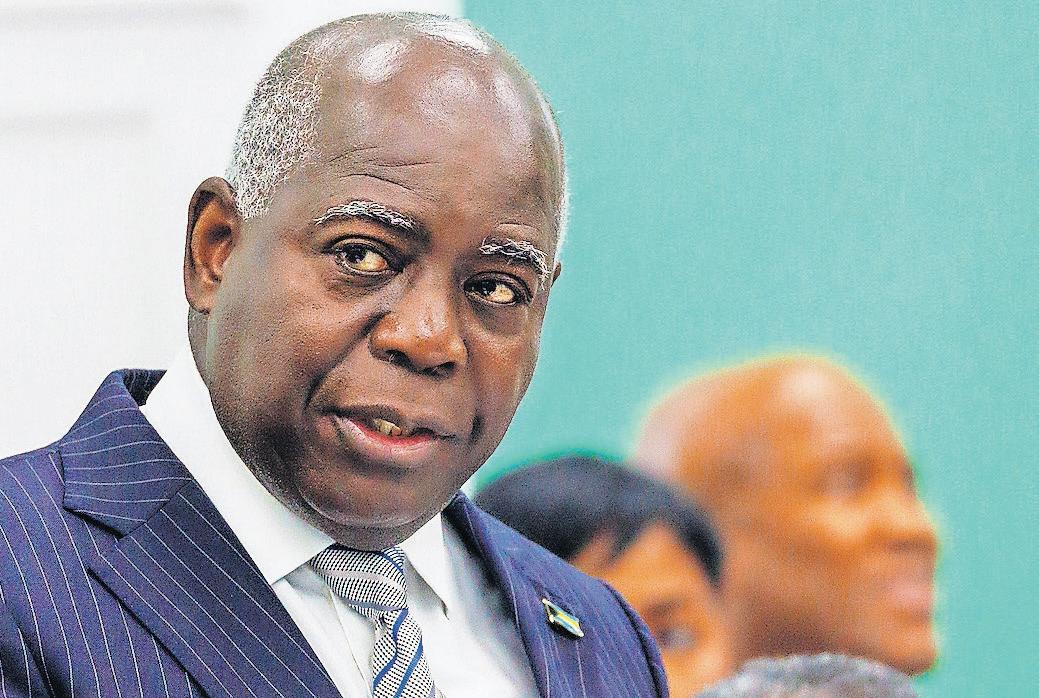
Authority Bill runs deeper than JCNP leaders suggest. Mr Bowleg said yesterday that despite public resistance from the JCNP, numerous Junkanooers and JCNP members have privately voiced their backing for the legislation. “You will find out there are much more persons in Junkanoo

By KEILE CAMPBELL Tribune Staff Reporter kcampbell@tribunemedia.net
PRIME Minister Philip Davis hailed a ruling from the International Court of Justice (ICJ) yesterday as “seismic” for The Bahamas, declaring it a global acknowledgment that climate change threatens the very survival of small island nations.
“This decision confirms what we have long advocated — that climate change threatens the most fundamental human rights of Bahamians, including the rights to life and personal security,” Mr Davis said.
“For The Bahamas and other small island states, this ICJ ruling is seismic.”
The ICJ’s advisory
opinion, delivered Wednesday in The Hague, establishes that countries have legal obligations to reduce greenhouse gas emissions and that failure to do so may constitute an internationally wrongful act. The ruling transforms what has long been a moral argument into binding
By PAVEL BAILEY Tribune Staff Reporter pbailey@tribunemedia.net
A POLICE officer was remanded to prison yesterday after being charged with raping a 16-year-old girl in Mayaguana last month.
Police Constable 3911 Nigel Brown Jr, 35, was arraigned before Assistant Chief Magistrate Carolyn Vogt-Evans on a charge of rape. He appeared calm during the hearing. Brown is accused of raping the teen at a residence in Mayaguana sometime between June 16 and 30. The girl is reportedly known to him. He was not required to enter a plea and was told the case would proceed to the Supreme Court via a
By
ATTORNEY Harvey Tynes, KC, has died at age 80, leaving behind a storied legal career. Recognised as one of the country’s foremost constitutional law experts, Mr Tynes practiced law for over 50 years through his firm, Tynes & Tynes, earning respect across The Bahamas’ legal community.




ATTORNEY from page one
Attorney Brian Hanna, a close colleague, said they were actively collaborating on a case until Mr Tynes’ final months. “It is a great loss,” Mr Hanna said.
“Harvey and I were waiting on a decision from the court as we speak. We were working on a case for the past six months, and we were in and out of court.”
Describing Tynes as a mentor and family figure, Mr Hanna noted his fierce courtroom presence.
“Harvey would always say to me, ‘I don’t ask for favours, and I don’t negotiate. I will take every book out of my library and beat you with it’.”
Mr Hanna added that Tynes was humble and generous with his legal knowledge.
Called to the Bahamas Bar in 1975, Mr Tynes handled numerous high-profile constitutional cases and served as co-chair of the 2002 Constitutional Review Commission. His practice spanned civil and family law, as well as general legal counsel.
“His work was felt across the fields of law, business, public service, and community development,” she said.
Minister of Foreign Affairs Fred Mitchell called him “a giant of a man” and a proud nationalist.
“Beyond his brilliant legal skills, impressive work and achievements in the courts, and love for the law, Harvey was a wonderful, grounded human being who always made time for people from all walks of life,” he said.
Mr Mitchell described him as a trusted advisor.
“The time spent was loaded with rich mentorship, wise counsel, inspiring lessons, historical and mischievous storytelling, clever humour, and unmatched stubbornness,” he said.
Mr Tynes, a devoted Anglican, is remembered as a principled advocate, a family man, and a beloved mentor. He is survived by his wife, Ingrid, his children, relatives, friends, clients, and colleagues.

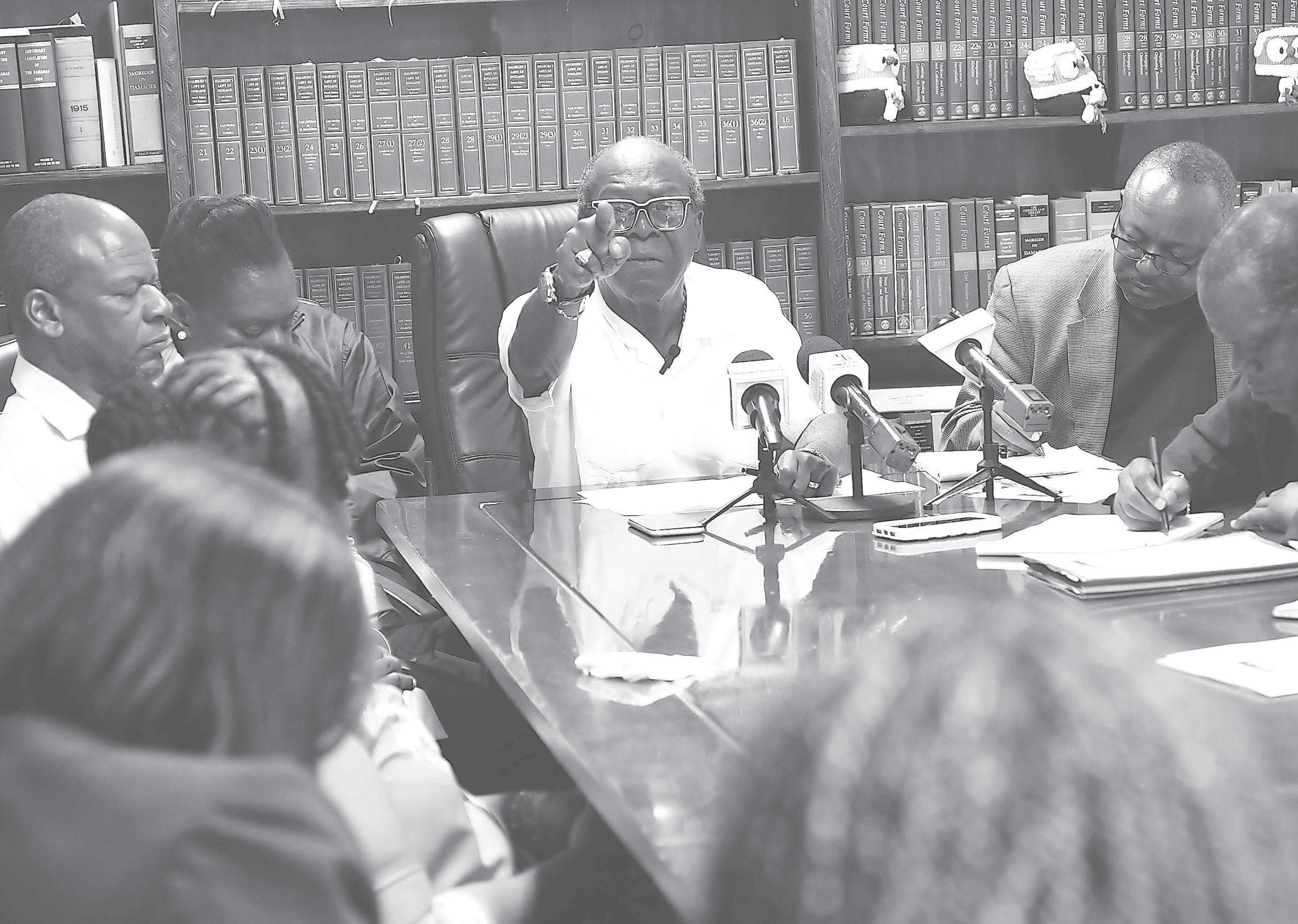
By LYNAIRE MUNNINGS Tribune Staff Reporter lmunnings@tribunemedia.net
THE Bahamas Taxi Cab Union has severed ties with the Bahamas National Alliance Trade Union Congress (BNATUC) and returned to the Trade Union Congress (TUC), accusing its former affiliate of a conflict of interest and slamming the government for failing to protect the taxi industry from unregulated competition.
Union president Tyrone Butler said the BNATUC’s connection to the Livery Drivers Association, an industry rival, was unacceptable at a time when taxi drivers are already battling livery franchises, unregulated rideshare operators, and a flood of new plates.
“That was a position that we found very uncomfortable, to have two organisations competing against each other in the workspace, but represented by the same president in one congress, that just wasn’t something that we felt was in our best interest, so it was a conflict of interest,” Mr Butler said.
“We are fighting livery drivers every day, and then we have to sit with them in a congress meeting headed by Belinda Wilson. That was something that we expressed our disappointment, and we thought that that could not work.”
Mr Butler said returning to the TUC, where the taxi union was originally a founding member, is a strategic move to gain stronger backing amid escalating threats to the industry.
“We believe the Trade Union Congress gives us the best opportunity to achieve some of our goals,” he said. “We are under siege right now with so many challenges in the ground transportation industry.”
He warned that
government inaction is deepening the crisis, accusing officials of allowing livery drivers to solicit customers in restricted spaces such as hotels and airports.
“The law does not provide for a livery franchise to be in the same space as a taxi driver. It is insulting to a customer for a customer to walk out of the hotel or the airport, and somebody asked them if they would like a particular type of vehicle,” Mr Butler said.
“It is wrong. It is insulting, and any government that encourages that really has no vision for what is good customer service.”
Mr Butler said recent government decisions have worsened the issue, with over 800 new taxi plates and 300-400 livery plates issued without expanding the market. He said this dilutes driver income, especially since only Baha Mar has significantly increased tourism capacity.
The union leader also blasted the rise of illegal rideshare operators, or “hackers”, calling them a public safety threat and a liability risk. The government later issued a notice confirming the illegality of such services using private vehicles.
TUC president Obie Ferguson welcomed the union back with a promise of solidarity and action.
“Whenever you all decide to make a move in your interest, we, in the TUC, will be with you. You’re not going to go a day alone,” Mr Ferguson said.
“We’re going to do something that is going to be dramatic, and it’s going to be effective.”
The Bahamas Taxi Cab Union, which has over 1,500 active drivers and nearly 400 registered members, is pushing for legal enforcement, regulatory clarity, and a halt to the unchecked expansion of livery and taxi plates.
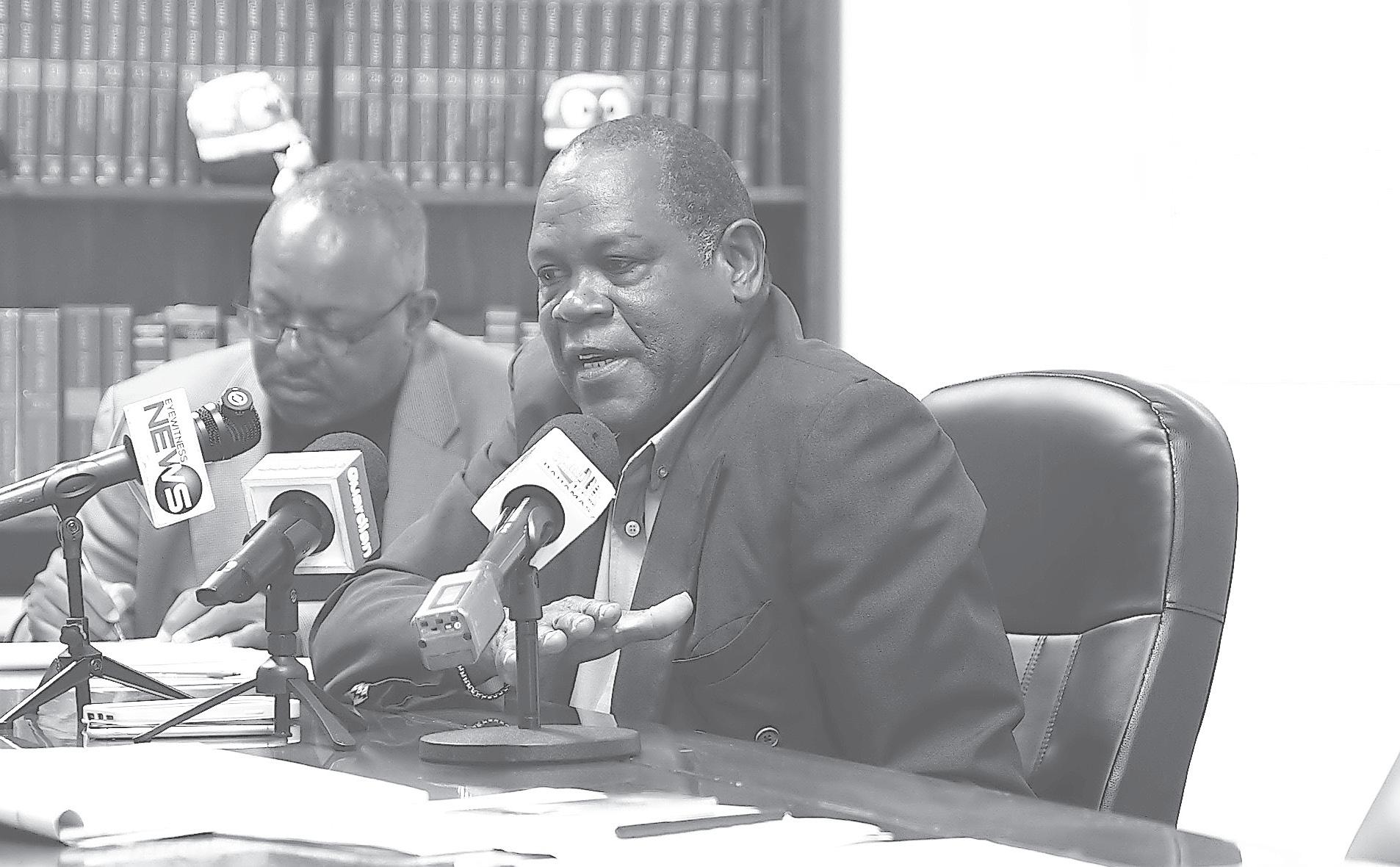
TITLE from page one
voluntary bill of indictment (VBI). He was also advised of his right to seek bail from the higher court. Brown will be held at the Bahamas Department of Correctional Services until the VBI is expected to be served on November 27.
P OL IC E have launched an investigation into the suspected suicide of a 27-year-old man in Bahama Palm Shores, Abaco.
O fficers were called to a home in the area around 8pm on Tuesday, where they found the man unresponsive with a gunshot wound. A firearm was
recovered at the scene. He was later pronounced dead by a doctor. Police have not released the man’s identity.

“That was a position that we found very uncomfortable, to have two organisations competing against each other in the workspace, but represented by the same president in one congress, that just wasn’t something that we felt was in our best interest, so it was a confict of interest,”
Taxi Cab Union president Tyrone Butler


international law.
The Office of the Prime Minister called it a “historic shift”, and pledged to use the ruling to press for deeper emissions cuts and secure compensation for climaterelated loss and damage.
Attorney General Ryan Pinder, who presented The Bahamas’ case at the ICJ last December, said the court validated the nation’s stance.
“Today’s decision affirms that The Bahamas was right all along,” Mr Pinder said. “Climate change is not just an environmental issue — it is a human rights issue. The court has made it clear that the world’s largest polluters must take responsibility and help repair the damage they have caused. This is not charity — it is a legal obligation.”
The court’s decision follows a request from the UN General Assembly, spurred by a campaign led by Vanuatu and backed by 39 small island states, including The Bahamas.
During hearings, Mr Pinder warned that The Bahamas faces existential threats, a reality he said was illustrated by Hurricane Dorian in 2019, which caused over $3 billion in damages, destroyed vital infrastructure, and displaced tens of thousands. Earlier storms like Joaquin and Matthew caused widespread
flooding and long-term displacement.
Regional research shows rising seas and intensified hurricanes are compounding national security, economic fragility, and public health threats in the region.
Rochelle Newbold, Director of the Climate Change and Environmental Advisory Unit, emphasized the significance of the court’s recognition of these threats.
“Small island states like The Bahamas have always led the fight for climate justice,” she said. “This decision affirms our right — and our people’s right — to life, to safety, and to a healthy climate.”
The ICJ declared that a clean, healthy, and sustainable environment is a human right. It placed specific legal obligations on industrialised nations to reduce emissions and to support vulnerable states financially and technically.
Climate change advisor Charles Hamilton said The Bahamas is now better positioned to demand international compliance.
“Today’s outcome is clear,” he said. “The Bahamas continues to punch above its weight. We are hopeful about the impact of this landmark decision. All countries must take responsibility for protecting our shared climate — and when they fail, they must be held accountable for the damage done to small island nations like ours.”


By DENISE MAYCOCK Tribune Freeport Reporter dmaycock@tribunemedia.net
KWASI Thompson, MP for East Grand Bahama, is urging the Davis administration to provide an update on the status of the Grand Lucayan Resort, particularly concerning current operations and the future of employees.
Mr Thompson said hotel staff remain uncertain about their employment and whether they will be retained or let go under new ownership.
“The employees have not been informed as to the status of their employment,” he said in the House of Assembly on Wednesday, pressing the government for clarity on future plans for the resort.
“When are they going to be transferred over, or if they are going to be transferred over? When are they
going to be severed, and what is their severance pay going to be?”
He criticised the administration’s lack of transparency.
“All of that, Madam Speaker, speaks to the government’s lack of providing transparent information in their dealings,” he said.
He also highlighted the apparent cessation of hotel operations.
“The Grand Lucayan, as we have been informed, is no longer taking reservations. They are proceeding to close. We need to understand what is the plan with respect to the Grand Lucayan,” he said.
In May, the government signed a Heads of Agreement with US-based Concord Wilshire for a $120m sale of the resort.
Prime Minister Philip Davis touted the $827m redevelopment project as “ambitious,” promising
1,300 construction jobs and more than 1,700 permanent positions, 80 percent of which would be held by Bahamians.
However, Mr Thompson said the public has seen no further updates or progress since the announcement.
He also questioned why no demolition work has begun, despite earlier promises.
“You can go to the property right now — there’s no sign of demolition, no work crews, no machinery, nothing,” he said.
The Grand Lucayan has been a contentious issue for Grand Bahama since the Minnis administration bought it in 2018 for $65m to protect tourism and jobs. A proposed deal with Royal Caribbean Cruise Line and ITM Group was scrapped when the PLP took office in 2021, and multiple sale attempts have since stalled.
and in the JCNP in these groups who have personally called me that agreed to this bill,” he told reporters outside the House of Assembly.
The JCNP suspended activities on Monday after a meeting of A, B, and D Division group leaders, citing concerns that the bill would centralise control and undermine their self-governance. But the move has stirred backlash from some within the Junkanoo community, with some members accusing the JCNP of acting unilaterally and without broad consultation.
Jameko Dean, a founding member of Genesis, challenged the JCNP’s claim of a unanimous vote. “I know Junkanoo groups try to stand in unison but at the end of the day groups are independent of themselves,” he said, emphasising that he was not speaking on behalf of Genesis.
Mr Dean alleged that members were pressured to align with the JCNP’s position or risk suspension and claimed that leaders were read the bill aloud without being provided copies. “It was like, hey, they’re using us as the bullet in the gun against the government, which, in that is not the way we should be operating,” he said. He also criticised the
JCNP for abruptly cancelling practices without adequate communication. He said the bill deserves consideration and could co-exist with the JCNP to elevate Junkanoo to greater prominence.
The JCNP’s decision halted costume production, music and choreography rehearsals, Emancipation Day celebrations, and smaller group rush-outs, all key aspects of the cultural calendar.
JCNP public relations officer John Williams denied claims of coercion, saying that group leaders voted freely and unanimously. He said the bill was shared in confidence, and time constraints from the Ministry of Youth, Sports and Culture forced a swift response.
While the JCNP supports the bill’s concept, he said, the organisation takes issue with specific elements of the draft.
Mr Bowleg maintained that the bill aims to formalise Junkanoo as a national institution capable of generating economic benefits, with an independent authority taking over the government’s role in managing the parades. He accused the JCNP of misrepresenting the bill to the public.
In the face of growing tensions, Junkanoo group leaders and JCNP representatives met with Mr Bowleg in a closed-door meeting last night.

By PAVEL BAILEY Tribune Staff Reporter pbailey@tribunemedia.net
A MAN was charged with sacrilege yesterday after allegedly breaking into and stealing from a church on Prince Charles Drive last week.
Eric Saunders, 35, was arraigned before Senior Magistrate Kendra KellyBurrows on charges of sacrilege, shop-breaking, unlawful possession, resisting arrest, and two counts
of causing damage. Saunders allegedly broke into East Temple First Church of Our Lord Jesus Christ between July 19 and 20 and stole two cases of Coca-Cola valued at $44. He allegedly caused $250 in damage to two church doors during the break-in. He was also reportedly found in possession of two 20lb gas tanks reasonably suspected of being stolen. On July 20, around 2pm, Saunders allegedly resisted arrest and damaged a police
officer’s pants worth $80. He pleaded not guilty to all charges. Sergeant Vernon Pyfrom, the prosecutor, did not object to bail, noting Saunders had no prior convictions.
Bail was set at $2,000 with one or two sureties. As a condition of his release, Saunders must sign in at his local police station on the first Monday of every month. His trial is scheduled for October 20.

DR. KENNETH ROMER, Director of Aviation and Deputy Director General of Tourism, reaffirmed the government’s commitment towards a safe and robust aviation industry as he delivered the Keynote Address at the 2025 Bahamas Air Navigation Services Authority (BANSA) Safety Conference. In attendance were pilots, incident and accident investigators, safety personnel, supervisors, and other relevant stakeholders locally, regionally, and internationally.
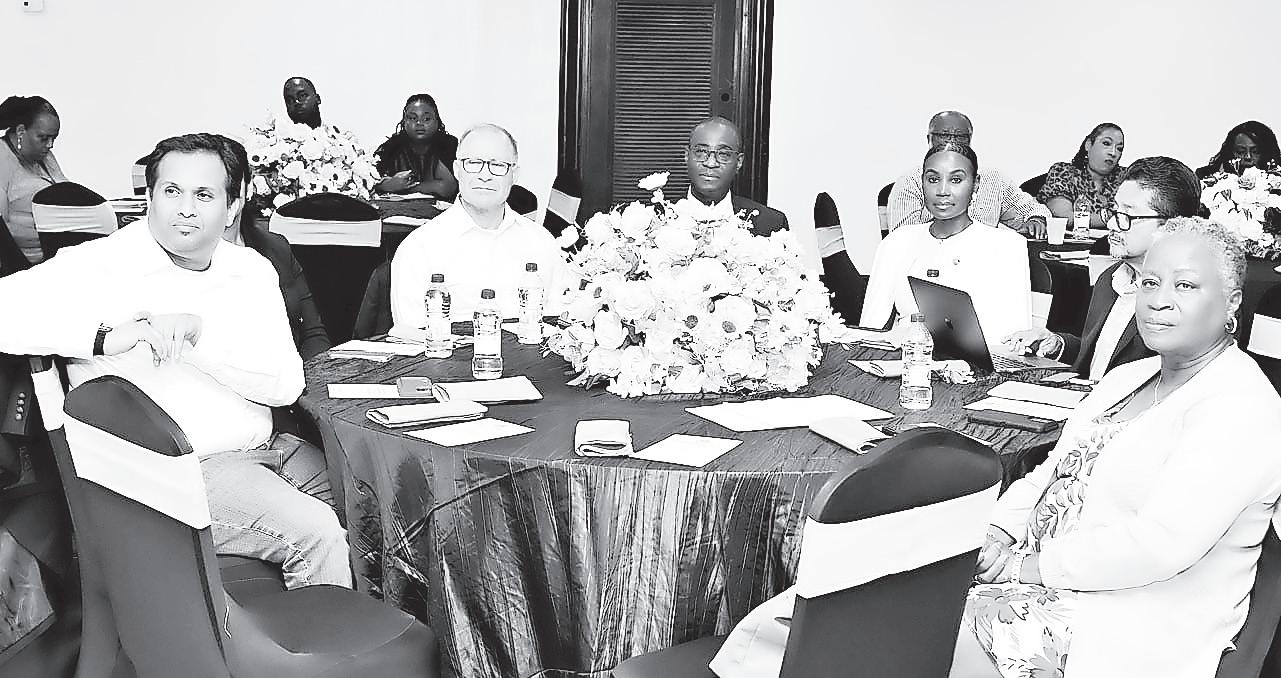
“You will fnd out there are much more persons in Junkanoo and in the JCNP in these groups who have personally called me that agreed to this bill.”
Mario Bowleg Culture Minister

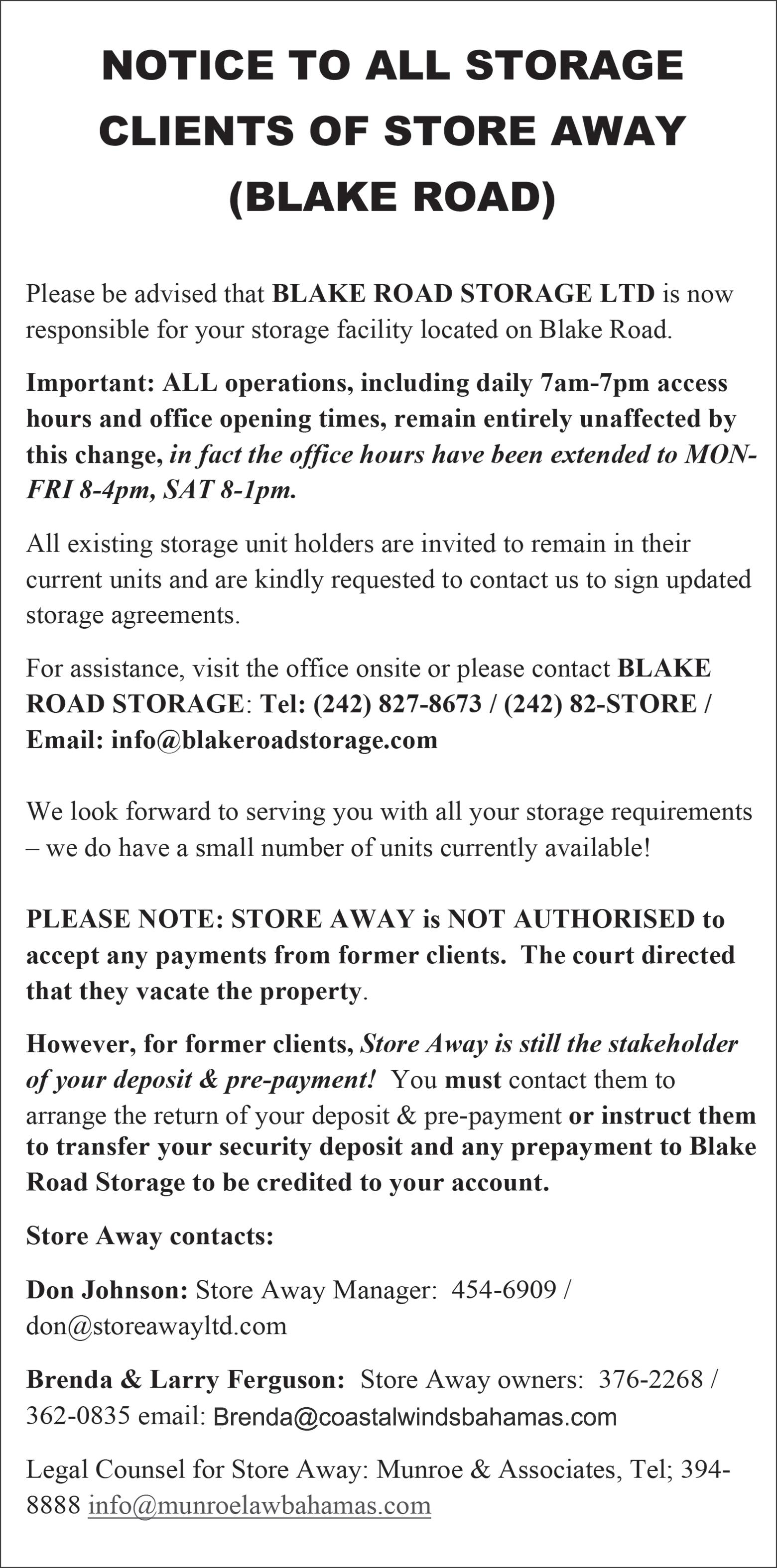
NULLIUS ADDICTUS JURARE IN VERBA MAGISTRI
“Being Bound to Swear to The Dogmas of No Master”
LEON E. H. DUPUCH
Publisher/Editor 1903-1914
SIR ETIENNE DUPUCH, Kt., O.B.E., K.M., K.C.S.G., (Hon.) LL.D., D.Litt .
Publisher/Editor 1919-1972
Contributing Editor 1972-1991
RT HON EILEEN DUPUCH CARRON, C.M.G., M.S., B.A., LL.B.
Publisher/Editor 1972-
Published daily Monday to Friday
Shirley & Deveaux Streets, Nassau, Bahamas N3207
TELEPHONES
News & General Information
(242) 502-2350
Advertising Manager (242) 502-2394
Circulation Department (242) 502-2386
Nassau fax (242) 328-2398
Freeport, Grand Bahama (242)-352-6608
Freeport fax (242) 352-9348
WEBSITE, TWITTER & FACEBOOK
www.tribune242.com


THE ruling by the International Court of Justice (ICJ) that countries have legal obligations to reduce greenhouse gas emissions has been described as “seismic” by our prime minister – but in a world where the United States is busily ignoring climate change, the earth may not have moved very far.
The ruling is strong, but the consequences of the ruling may be short.
In its advisory opinion, the ICJ said that failure to reduce gas emissions may constitute an internationally wrongful act. That takes a long-standing moral point of view, and turns it into law.
A law, however, is only as good as its use. There are plenty of unused laws –or dead laws – on the books around the world, zombie legislation that still exists in writing, but which has long gone untested, or has been overtaken by the pace or the reality of the world around us.
Prime Minister Philip Davis rightly took a victory lap over the ruling, which is on an issue he has been outspoken about internationally.
He said that it confirmed “what we have long advocated – that climate change threatens the fundamental human rights of Bahamians, including the rights to life and personal security”. It is a victory lap that is not his alone. His warnings about climate change are echoes from across the years from other Bahamian prime ministers.
In 2019, Dr Hubert Minnis, when referencing the impact of storms, asked the United Nations General Assembly: “How will we survive, how can we develop, how will we continue to exist?”
In 2015, Perry Christie talked in Paris of an “existential threat to the survival of small island developing states”.
In 2009, Hubert Ingraham warned that climate change “is a serious threat to
our economic viability, our social development and our territorial integrity”.
As we have noted in this column before, try getting that collection of leaders to agree on anything else – you will have a tricky task – but they agree on the perils of climate change for The Bahamas.
Attorney General Ryan Pinder reiterated the effect of the court’s ruling, saying that the court “made it clear that the world’s largest polluters must take responsibility and help repair the damage they have caused. This is not charity – it is a legal obligation”.
But will those polluters take that responsibility?
US President Donald Trump recently pushed his controversial “Big Beautiful Bill” through Congress, the details of which included a green light for oil and gas drilling within the Arctic National Wildlife Refuge.
Trump has previously chanted “drill, baby, drill” for his energy policy in his inauguration speech. Fossil fuels to the fore.
From day one of the Trump administration, he started tearing up protections. The Paris climate agreement? Donald does not agree.
He talked of how the US would be “a rich nation again and it is the liquid gold under our feet that will help us do it”.
Where the US leads, others have followed. With no consequences seemingly at present for such policies, will the ICJ ruling really have an effect?
So while we welcome the court’s ruling – and it will absolutely be a marker to put down in future discussions, to help put pressure on polluters to bring about change, how “seismic” its effects will be are very much uncertain. The cause is right, the arguments are right – but the world’s polluters may not be listening.
EDITOR, The Tribune.
AS a born, bred, ga dead Bahamian and proud resident of New Providence, I write with deep concern about the state of Goodman’s Bay Beach, one of the last easily accessible public beaches for Bahamian families.
In recent months, there has been a clear and growing trend: unauthorised commercial operators are setting up chairs, umbrellas, and water sports equipment along the shoreline, occurring from the ramp near Breezes Hotel and moving further and further eastward. Many of these setups appear unregulated and are clearly targeted at tourists being brought in by taxi drivers and tour companies. What should be a space for community, rest, and recreation is increasingly becoming a Pop-Up Profit Zone. Even more troubling is the reckless use of watercraft and motor vehicles on the shore and onto the sand. Recently, near the Goldwynn Resort, and behind private property (where lawn chairs are being hidden), vehicles have been seen driving onto the beach while children play nearby. This is a dangerous
and completely unacceptable practice. The parking lot and greens are also deteriorating, with cars driving over the grassy areas and damaging what little infrastructure remains.
This is not simply a matter of aesthetics or inconvenience. It is a question of public safety, access, and respect for shared national spaces. Beaches belong to the Bahamian people not to unregulated vendors or unchecked tourism activity. I urge the relevant agencies to come together swiftly to address this issue: The Public Parks and Public Beaches Authority must lead with clear guidelines, designated areas, licenses, and active enforcement for vendors. The implementation of Park Wardens is more than a good recommendation, but a requirement at this point.
The Ministry of the Environment and Natural Resources can ensure the ecological protection of the area and prevent vehicles from damaging sensitive beachfront.
The Ministry of Works can assess and improve the crumbling parking infrastructure, installing proper signage and
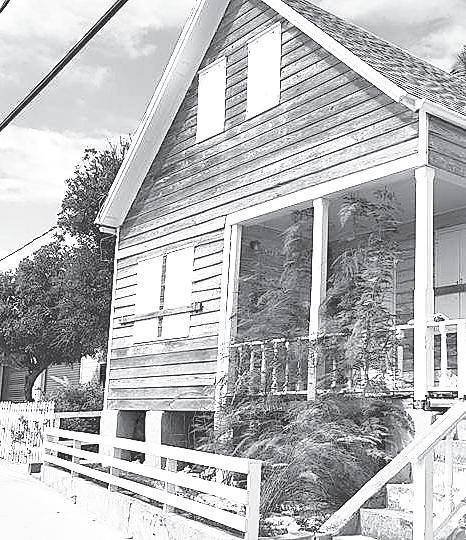

reinforcing boundaries.
The Ministry of Tourism can help balance visitor engagement with local access and enforce ethical tour operator practices.
The Royal Bahamas Police Force and Defence Force must actively patrol and respond to unsafe watercraft activity on public beaches.
This is not a call for blame, it is a call for action! Together, these agencies have the power to protect one of our last remaining communal beachfronts and inspire our people to fully enjoy our natural resources.
Let this be the moment we draw a line in the sand not just literally, but figuratively. Let us ensure that Goodman’s Bay remains a place where Bahamian children can play safely, locals can exercise and engage in sporting activities, elders can walk peacefully, and families can gather freely.
This letter is not just a plea it is the beginning of a public movement: #SaveGoodmansBay.
CONCERNED BAHAMIAN RESIDENT Nassau, July 13, 2025.
EDITOR, The Tribune. THERE is the belief that politically there were only two competent slate of candidates, politicians with the ability to govern the Commonwealth of The Bahamas, and generally you hear this misnomer for people with a “horse in the race”, but is it a fact, or is it fiction? To dispel the conveniently displaced prejudices towards those who may want to run, but do have a level of distrust for the competences of the two existing political parties, and world like to align themselves with an alternative group, does little to engender the drive, ambitions of the ones seeking to be recruited and be able to make a contribution, a meaningful in the trenches helping to improve the protection of the state, and welfare of Bahamians, do carry. I also wished to dress up the reasoning why that designation only the two-party system is capable of governing the Commonwealth of The Bahamas. But if that were true, I wonder what level of education was obtained to be able to qualify for the job? If the commonality among them were furnished with bachelors, masters a much higher discipline, what qualifies them to have succeeded? And were those recipients only PLPs or FNMs? And what I will say about what helps people to achieve competences do have much to do with years in office, if their objective were one of doing the very best job that their ability provides, because conversely, some have been in the trenches many decades but what have they garnered, nothing worthy of praise, bitterly?
In actuality, I am aware of the scores, and scores of Bahamians in positions of prominence abroad, in the UK, in Canada, and in the US holding down jobs that heretofore, wouldn’t be possible had they been domiciled in the Commonwealth of Bahamas, but how come? Based on sacred scriptures wisdom, knowledge and understanding comes from God Almighty, and what He has not done
was apportioned talents, the wit based on what political party one was affiliated with, otherwise?
So, all of the people attempting to keep the milk honey flowing between two factions, PLPs and FNMs, please, I beg of you to stop the brainwashing of the Bahamian people, by promulgating the false narrative. If truth be told, there is a case to be made and the grounds to base the reasoning on is been established already, as clear as day, to consider the evidence having governed between the two Bahamian political parties, inclusive of the UBP for more than 70 years, and what have we to really show?
The queries being based on sound reasoning, nothing personal, but there is a serious disconnect taking place in the land, whilst many have sought to deny, sugarcoat, deflect blame, provide false narratives, go off the highway to castigate another budding politician, a competitor just to score political points shall not fly with Father God, the only objective that politicians were supposed to have is really country based, not anything else, but what have we seen? While the country’s neighbourhoods fall into utter decay, and to such a degree that resurrecting them is almost impossible. Salaries of Bahamians were so low that inflation, costs goods at the grocers gobbles the funds, causing many themes needed items to be returned to the shelves, isn’t happening because only the two political parties have the smarts?
There is a commonality occurring in many publics of our country and that is that no matter what street you may choose to walk, breathing natural fresh air becomes challenged, frequently mixed with God’s natural air is the odor of marijuana smokers, as young men and not so young can be seen those bareback smoking, taking the smoke as their chests
seemed near to wanting to cave in, letting out a cloud of blue smoke permeating the once uninfluenced air, into the vicinity, an odour comparable to old burned car tires, and is it still illegal doesn’t seemed to matter, why?
And as for the public, you wouldn’t believe that this is happening in our Bahamaland, one would be more inclined to believe that they were having a dream of being in Africa, some countries of the Caribbean, but definitely not in the Commonwealth of The Bahamas. Our country is dying, and at a rather swift clip, and about our flavour of country, Lord, what I see is scary, and about the tints used to hide the operators of especially the little Japanese cars, and anytime they approached me, I am fearful, not knowing if someone in the inside would hold me up or something is where we are as a capital city, the seat of commerce, and all of the boasting about tourism, and The Bahamas open for business, what utter garbage? When the city centre is laden with filths, but yet again only the two political parties were competent, not a brand of third-party insertion into the maze, a rescuing of the Commonwealth of The Bahamas before it becomes too late?
And about the legislature to act, recently a man on bail, had had a previous murder case, was before the court on bail for another, whilst on bail committed yet another, I know it sounds like a conundrum, but it has my head in a tailspin also, how could this happen? Well, the legislators have not convened and made it impossible for offenders of serious crimes to get numerous bail no matter what?
You know many of you can’t take truths, so I rest. Now COI, the Bahamian people do want something of substance candidates wise to be able to break the backs of the two-party system, but if they don’t see the talents within the party to be willing to give you guys a chance, why?
FRANK GILBERT
Nassau, July 21, 2025.
By LEANDRA ROLLE Tribune Chief Reporter lrolle@tribunemedia.net
PRIME Minister Philip “Brave” Davis hit back at opposition criticism yesterday, defending his administration’s plan to modernise the country’s voting system through biometric voter ID cards.
He rejected claims of a rushed process and accused critics of political theatrics.
“We are not introducing a law on biometrics, ya know; what we are introducing is the process under which we can get to biometrics,” Mr Davis said in the House of Assembly. “The law for biometrics was introduced by yourselves in 2020. Y’all were moving to get it done but the member for Killarney called the election before y’all could get it done.”
His remarks followed National Security Minister Wayne Munroe’s tabling of the Parliamentary Elections (Amendment) Bill, 2025. The legislation sets the stage for sweeping electoral reforms, including the introduction of optional biometric voter ID cards embedded with digital fingerprints, facial recognition, and electronic signatures.
If passed, the bill will also establish secure e-poll books, mandatory voter verification exercises every ten years, and new safeguards against fraud. Violations, such as falsifying information or tampering with the electronic register, could result in fines of up to $10,000 or a year in prison.
Mr Munroe said the system would improve accuracy, save money, and align with global best practices.
“Once the legal framework is enacted and a public education campaign is launched eligible voters whose biometric data already exists with the
passport office, will have the option to consent to a secure data transfer, reducing the need for in person enrollment,” he said.
“Madam Speaker, this is a commonsense approach that saves time and taxpayer money.”
He also highlighted recommendations from the Organization of American States following the 2021 general election, which urged The Bahamas to digitise voter registration and move toward biometric identification.
Despite assurances that biometric IDs will be optional, opposition MPs voiced concerns over public engagement. FNM MP Kwasi Thompson said the process requires national buy-in, not top-down decisions.
“It requires us to bring the nation along and not just to dictate what these changes would be,” Mr Thompson said.
FNM deputy leader Shanendon Cartwright also questioned oversight and cybersecurity protections.
“We want to be sure that Bahamians will not be disenfranchised in any way by this medium,” he said.
Mr Munroe, meanwhile, defended the reliability of the proposed system.
“This technology includes full encryption and contingency print backups, ensuring systems work reliably even challenging circumstances,” he said. “In short, Madam Speaker, if the light go off, if the internet goes down, the paper will be there as a backup.”
The bill sets a new electoral timeline, with the writ of election return scheduled 26 to 35 days after issuance, nominations held five to eight days after the writ, and Election Day falling between 26 and 31 days following the notice.
Debate on the legislation is expected next week.
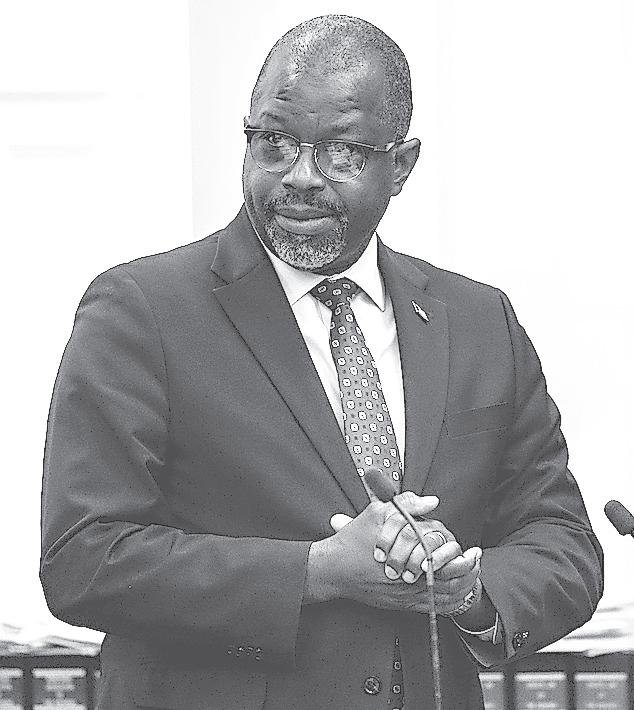

THE drug era of the 1970s and 80s had a devastating effect on individuals, families, and communities, effects which are still being felt decades later. Similarly, the continued rise and devastating effects of gaming, fuelled by a few business houses, is doing grave social and moral harm that is wrecking families and our democracy.
Unlike other economic sectors, gaming produces no genuine goods or services like agriculture, fisheries, education, tourism, and other productive services. Though the analogy is not exact, gaming, like illicit drugs, feeds off the addiction of many whose lives and livelihoods are destroyed by gambling habits.
Gaming has become dangerously normalised, with many believing that potential winnings are part of their daily lives and income generation. The proliferation of the gambling culture is so pervasive that its tentacles are seen in numerous neighbourhoods throughout New Providence. Even at the Mall at Marathon, there is a large gaming location.
With the reach of the gaming houses and the ability to gamble online throughout the day and night, gamblers can get their fix at any time with few restrictions by the state on the gaming trade.
Spinning has a particular psychological effect. One can keep spinning, not having to wait for a number to fall. One can spin oneself into bankruptcy and financial ruin at the expense of family and children.
Spinning is a highly addictive habit. More women are spinning than men. With women heading most households and being the primary breadwinner, this is especially destructive on family life and social culture.
There are multiple games gamblers can play around the clock from home, on their mobile devices, or in a gambling and casino establishment. While many buy numbers, spinning is also a game of choice for many.
Many Family Islands, with limited financial resources and economic opportunities, are being drained of money. Little of this money is ever returned to those communities. The fun days and giveaways
“Gaming has become dangerously normalised, with many believing that potential winnings are part of their daily lives and income generation.”


to these communities and in New Providence are a patronizing insult to Bahamians.
They are marketing schemes intended to flummox, bamboozle and trick, while hyping business. They create further dependency on gaming bosses, who use this economic power to gain greater political influence and notoriety. Why did we start to make gaming bosses, ambassadors?
It is a worrying and dangerous sign of the times when religious leaders
who publicly and privately opposed the legalisation of gaming are now accepting honours, public recognition, and/or money from gaming bosses. What happened?
How many religious ministers have accepted money from gaming interests even as their congregants suffer from the effects of gambling?
Moreover, how is it that those who benefit from gamblers squandering school fees, rent money, mortgage and car payments, and money for food, are somehow seen as heroes or upstanding entrepreneurs deserving of public adulation or potentially political office?
Instead of relying on funds given out by gaming houses for charitable causes, a state lottery, run through private management, would be a greater source of charitable giving. We should not be fooled: the donations given out by gaming houses are considerably more about power and influence than generosity of spirit.
Again, unlike most other businesses, gambling offers little productive, except the thrill of gambling itself and a promised reward
that rarely materialises. A well-regulated national lottery could have returned considerable rewards to Bahamians. Instead, the government of the day obsequiously bowed at the feet of gaming bosses.
As mass gambling has penetrated daily life, the sociological effect is farreaching in areas such as family life and in the formation of habits like saving money and investing in a better future.
For a country desperately in need of financial literacy and education, Bahamians are now bombarded and undermined with messages about gaming interests. The launch of a media house by one gambling baron is another example of amassing even greater power. How much more political and economic power will the gaming mandarins seek and toward what end?
We are witnessing a vast redistribution of wealth, including from poor Bahamians, to a few gambling bosses, who are further enriching themselves.
A national lottery could have greatly benefitted a vast number of Bahamians in areas such as education, social development, and the arts and culture. Instead,
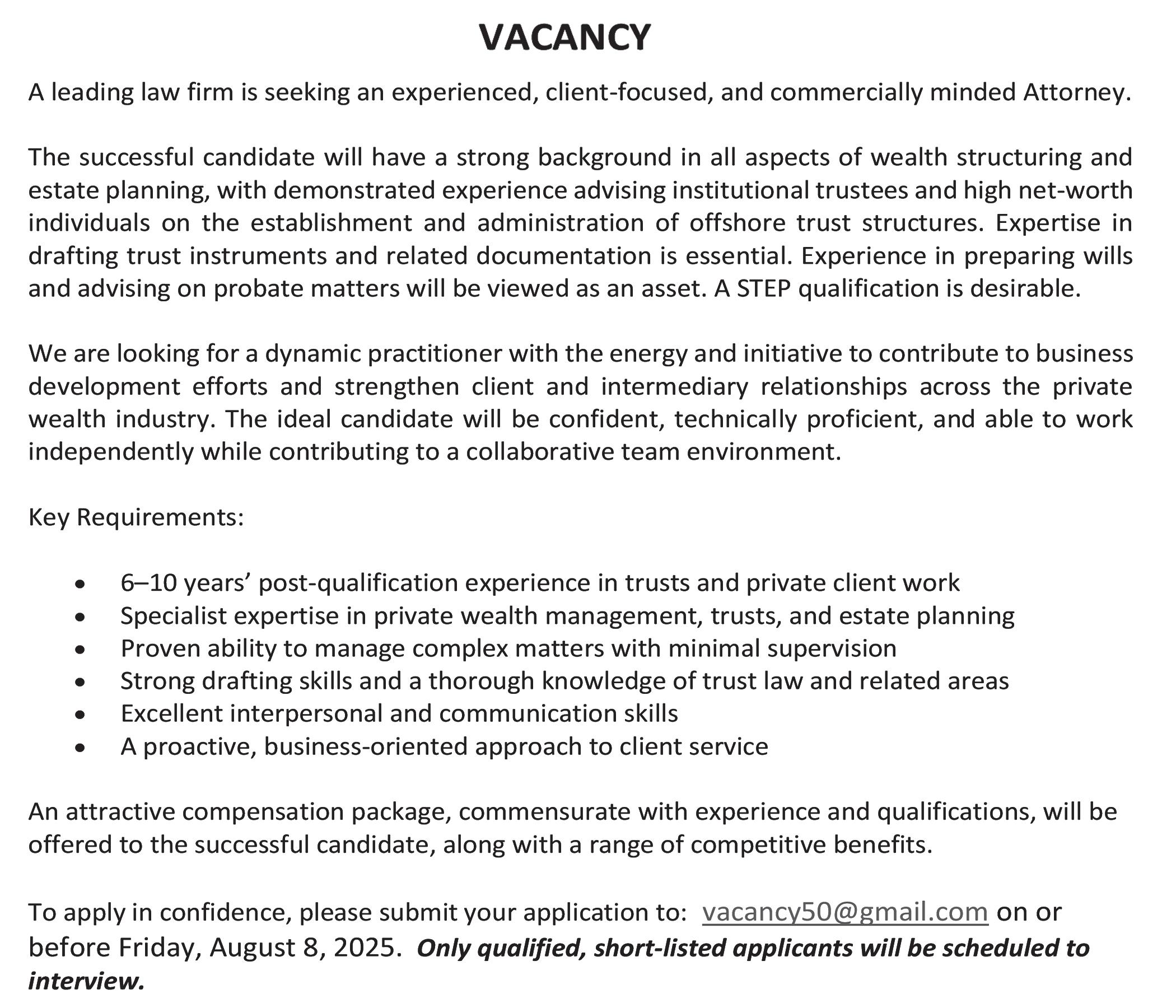
hundreds of millions and more are being gorged at the expense of national development.
This is the depth of inequality. It is an offence to social justice and moral goodness. Some of the considerable profits of the gambling barons could fund universal preschool in the Bahamas.
Investing in preschool education is known to be successful in helping children, especially children from disadvantaged backgrounds. This includes helping children to get a better start in life, helping them with health and nutrition and brain development
Pre-school help children to develop early skills in literacy, numeracy and oracy, as well as other basic life schools and human development, often missing in many of our children who live in difficult family and social circumstances.
Investing millions in preschool could help in the fight against crime and in the repair of our social culture. Instead, mass gambling may help to fuel more crime and to further damage our social culture.
The equation is simple: We have allowed a precious few to live in great comfort while thousands of poorer citizens could have benefitted from a national lottery. Have those who allowed this to happen to have no moral shame or regret as they live in great comfort?
Since majority rule and independence there has been a flourishing of the middle class, especially of black Bahamians. In 50 years of independence, the country has made great strides in terms of economic empowerment for scores of Bahamians.
Still, there remains much to be done to empower more Bahamians economically including greater access to capital for entrepreneurs to help stimulate domestic and home-grown investment. A national lottery would be a source of significant capital to help stimulate domestic development.
Communities in New
Providence the Family Islands do not merely need Christmas parties and giveaways. They need concentrated economic and social investments partly derived from a national lottery in which money is reinvested in these communities. Instead of a few tokens to the masses, the Bahamian people should be the majority shareholders and owners of a legalized lottery system, a sort of modern asue that can be used to advance national development. Historically, slave masters, colonialists, and the old guard hoarded wealth and rigged the economy to benefit their private interests at the expense of the masses and the public good. How shameful that a new guard which came into being to fight such entrenched greed at the expense of the mass of Bahamians, turned its back on the majority in thrall to a wealthy minority interest, making a mockery of much of the struggle for majority rule and independence.
Bahamians do not need scraps from the overflowing numbers banquet table. The table and the full meal belong to the people, not to a select few.
Today, gaming bosses have become more powerful and a greater threat to our democracy. While there is no constitutional restriction on a gaming boss running for parliament, all political parties should publicly state that they will not run a gaming boss or executive for the House of Assembly. The power of the gaming bosses has already become too great. Is it about to get even greater and more harmful as more Bahamians become addicted to gambling, while being brought temporarily high, and ultimately low because of their addiction, The profits from this addiction continues to flow to greedy interests who are doing our country grave and widespread moral harm. Where is the moral outrage!?

DO you remember QAnon?
It was a conspiracy theory that gained significant traction during the first Donald Trump administration. As explained in the US mainstream press, QAnon is “the idea that Trump was recruited by the military to take on a paedophile cabal that runs the world”.
This “cabal” is also referred to as the infamous, insidious, perhaps nonexistent “deep state”. And the QAnon mentality offers some insight into the current MAGA crisis sparked by actions by the Department of Justice and the FBI concerning the potential release to the public of more information about infamous financier Jeffrey Epstein.
To most people, QAnon’s conspiracy theory is so outrageously far-fetched that it taxes the imagination.
But it’s real to millions of Trump supporters and MAGA zealots, disaffected American voters and millions more folks who are just generally aggrieved. And while QAnon regards the military as a bulwark against the deep state, other conspiracy theorists see American armed forces as the deep state’s tool.
About six years ago, a perfectly reasonable-seeming county tax assessor shared some views that still seem relevant today. This man had in his hands and in his calculator the power to raise or lower his town’s real estate taxes. He held a very responsible position that could impact individual people’s lives in fundamental ways. Let’s call him Dave.
“I think Donald Trump was sent to us to save us from the deep state,” Dave said. “I’m a religious man. I go to church services every Sunday. My wife and I live a life that corresponds to our religious beliefs. But there’s a sinister force out there that we fear and that we have committed ourselves to oppose. Most people have no chance against the deep state.
“I’m pretty sure that the deep state controls our weather, for instance. I think that climate control through manipulation of the clouds in the sky is one of their primary tools to keep us regular people on edge and not able to think clearly.
“I think the deep state is grounded in American coastal elites who think only of their own wealth and powerful positions. They influence or control our elections.
“Here’s a great example of what they do: They provoke and wage wars constantly. Look at the US in the past 60 years! We’ve been at war most of the time: Vietnam, Panama, Grenada, the Dominican Republic, Bosnia and the Balkans, Iraq, Afghanistan, now Iran and Palestine through our support of


Israel. The list is endless. And I dare you to tell me how any of these wars actually help ordinary people like me.
“The deep state makes a fortune off arms sales. They don’t care about our military soldiers who die overseas somewhere hardly anyone could find on a map. See what I mean?”
Experts on conspiracy theories believe the ascendancy of Trump in the years leading up to his 2016 election unleashed a latent base of people in the US who were seeking some kind of explanation for the fact that they seemed to be falling behind economically and even socially while the country seemed to be booming.
Millions of people, while perhaps not able to articulate their feelings, nevertheless knew they weren’t doing better than they had been doing. They needed an explanation.
No doubt many assigned the blame to themselves and worked to change their situation via job or location change, training, etc. But for many more, conspiracy theories offered a seductive alternative.
Back in 2016, many Trump supporters clearly felt that he would be able to change their lives materially. Some of the people closer to the fringe have admitted that they believed Trump could lower prices, reduce the economic bite
“When you say that the absolute worst things that you can imagine are happening, and those people are going to get away with it and they rule over you, that really resonates with a lot of people.”
of home and car mortgages, and generally relieve the economic stress that kept them up at night.
Among the principal villains, as convincingly portrayed by Trump, were Barack Obama and Hillary Clinton. They were, after all, educated at Harvard and Columbia Universities. They rose from obscurity almost overnight to help lead the Democratic Party to surprising victories. Now, during Trump’s first term, the Obamas and Clintons were living lavish lifestyles
in expensive mansions and jetting around the world. Where did they get the money to do that, if not from the deep state?
No responsible commentator is suggesting that Obama or Clinton are paedophiles. So QAnon doesn’t indict them individually. But QAnon does certainly indict Jeffrey Epstein, whose mysterious fortune and powerful acquaintances and glamorous lifestyle were linked to federal charges that involved abuse of women and underaged children.
One commentator writing in the New York Times noted that there do seem to have been many scandalous sex abuse issues involving celebrities in recent years. “These scandals did actually exist, and they involved people like movie producer Harvey Weinstein, America’s TV dad Bill Cosby, the Catholic Church paedophilia scandal. And now we have the Diddy (music entrepreneur Sean Combs) parties and grotesque allegations.
On one hand, QAnon theory is outlandish. But on the other hand, there actually is a recurrent pattern of networks of powerful people or individuals abusing women or children. And it’s not just covering it up. It’s the fact that this horrible behaviour was known to other powerful people – public figures – who did nothing about it.
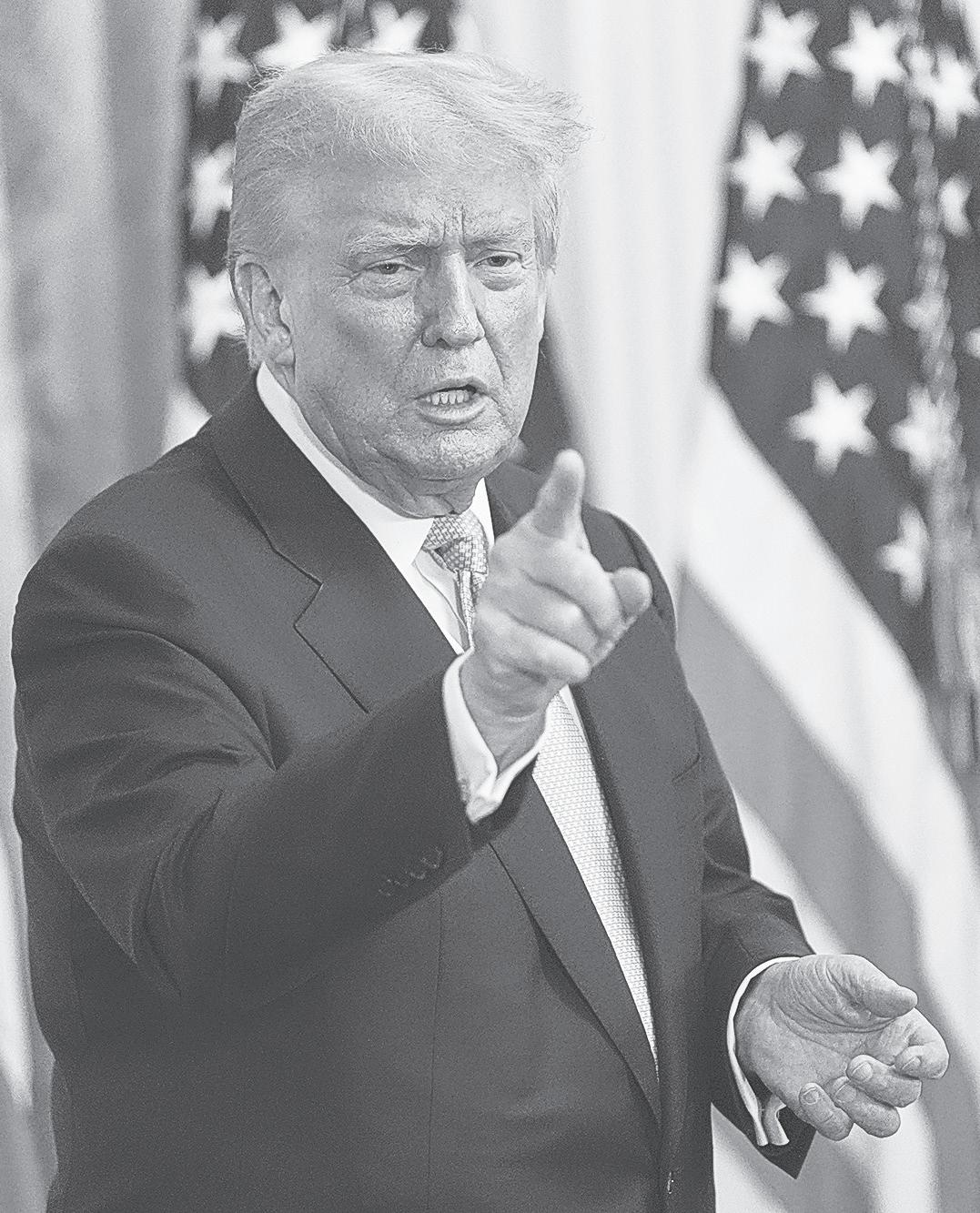
“There is a palpable truth to the notion that you cannot trust the elites to somehow expose and prosecute this behaviour. People see something true in QAnon and come to believe the wider theory is valid.
“When you say that the absolute worst things that you can imagine are happening, and those people are going to get away with it and they rule over you, that really resonates with a lot of people.”
Historians will likely chronicle a conspiracy theory continuum developing early in Trump’s first administration and then catching fire during the COVID-19 pandemic with all of its social and economic dislocations, Trump’s feckless attempts to make it go away and disdain responsible public health prescriptions from experts, and the overarching, jarring reality of over a million people dying in the US.
Dr Anthony Fauci was transformed from a trusted, avuncular public health adviser to someone representing and fronting for a shadowy, sinister group of anonymous conspirators whose aim was to cull the population through an induced plague.
Trump in his oblique, calculating way gave credence to QAnon and conspiracy theorists by referencing their social media posts or in casual comments to the press. Rep Marjorie Taylor Greene of Georgia is perhaps the most prominent QAnon theorist in contemporary public life, with a long history of social media posts.
In 2019, Epstein died in a Manhattan jail cell, having been indicted for various crimes including sex trafficking. The Times writer explained that “when Epstein was indicted and
then found dead, that made the whole business just explode because this was now a case where you didn’t appear to be a crazy person if you wondered what Epstein was doing. How did he have all these connections to people like Clinton and Trump?”
For most of this month, Trump and his administration have been clearly evasive on Epstein and related “papers”. No doubt Attorney General Pam Bondi and FBI leaders Kash Patel and Dan Bongino have not helped by their occasional public feuding and general clumsiness in trying to sweep the issue away from public attention.
Lots of old debris from earlier outrage about Epstein, including a shady plea deal done for Epstein by a Florida prosecutor who later became Trump’s Secretary of Labor, has risen to the surface again. House of Representatives speaker Mike Johnson on Tuesday abruptly dismissed the House for its annual lengthy summer break, deflecting a move to subpoena records and call witnesses with potentially explosive Epstein testimony. It looks like a clumsy attempt by Trump & Company to conceal and cover up some embarrassing truth about Epstein. The whole mess seems to confirm the old axiom that “what goes around, comes around”.
Lots of media are reminding us of Trump’s 2002 quote: “I’ve known Jeff (Epstein) for 15 years. Terrific guy. Lots of fun to be with. It is even said that he likes beautiful women as much as I do, many of them on the younger side. Jeffrey enjoys his social life.”
Now Trump says “nobody cares about Epstein”. But millions of the president’s followers do care.

By DESIREE K CORNEILLE
ACROSS the globe, from South Africa to Australia, India and throughout the Caribbean, conservation efforts are yielding powerful results. In The Bahamas, these successes are becoming harder to ignore. Sea turtles are nesting and congregating in numbers not seen in decades. Shark populations are rebounding, with sightings near Montague and Goodman’s Bay and across Exumian harbours.
One of our first signs of local recovery was the return of the white-crowned pigeon, once in decline but now rebounding under the protection of the Wild Birds Protection Act of 1952. Preferring remote mangroves and inland coppice, it has avoided major conflict with humans but remains at risk as development expands across both habitats.
But with these wins comes a new and less predictable challenge. This time, the problem is not decline. It is resurgence.
As wildlife returns, we are seeing the rise of human-wildlife conflict. Not because nature is vanishing, but because it is coming back.
Elsewhere, this may mean elephants damaging crops or wolves taking livestock. Here, it looks like sharks circling docks and swimmers, or turtles grazing seagrass beds where conch once thrived. Across our islands, people are voicing new concerns, not about extinction, but about how to coexist.
The laws that helped restore our wildlife now overlap with the daily lives of those living and working alongside nature.
The question is no longer just how to protect species.
It is how we plan to live with them, responsibly and sustainably, as they return. The turtle problem no one expected
In 2009, The Bahamas, through the Fisheries Resources (Jurisdiction and Conservation) Act, made it illegal to capture, possess, sell, or consume any of the nation’s five marine turtle species: hawksbill, green, loggerhead, leatherback, and olive ridley.
Since then, aided by marine protected areas and strong legal safeguards, green sea turtles have made a remarkable comeback. Once hunted for meat and shell or caught as bycatch, they now swim freely and graze across expansive seagrass meadows. But that grazing, while natural, is reshaping underwater landscapes in unexpected ways.
Seagrass beds are critical nursery grounds for queen conch, a keystone species in Bahamian culture and economy. As early as 2003, Allan W Stoner of the Caribbean Marine Research Center noted that overgrazed meadows in Exuma and parts of Eleuthera might be reducing juvenile conch survival. Today, fishers are raising similar concerns, citing seagrass loss, declining conch densities, and frustration.
“Something must be done. It’s happening too often,
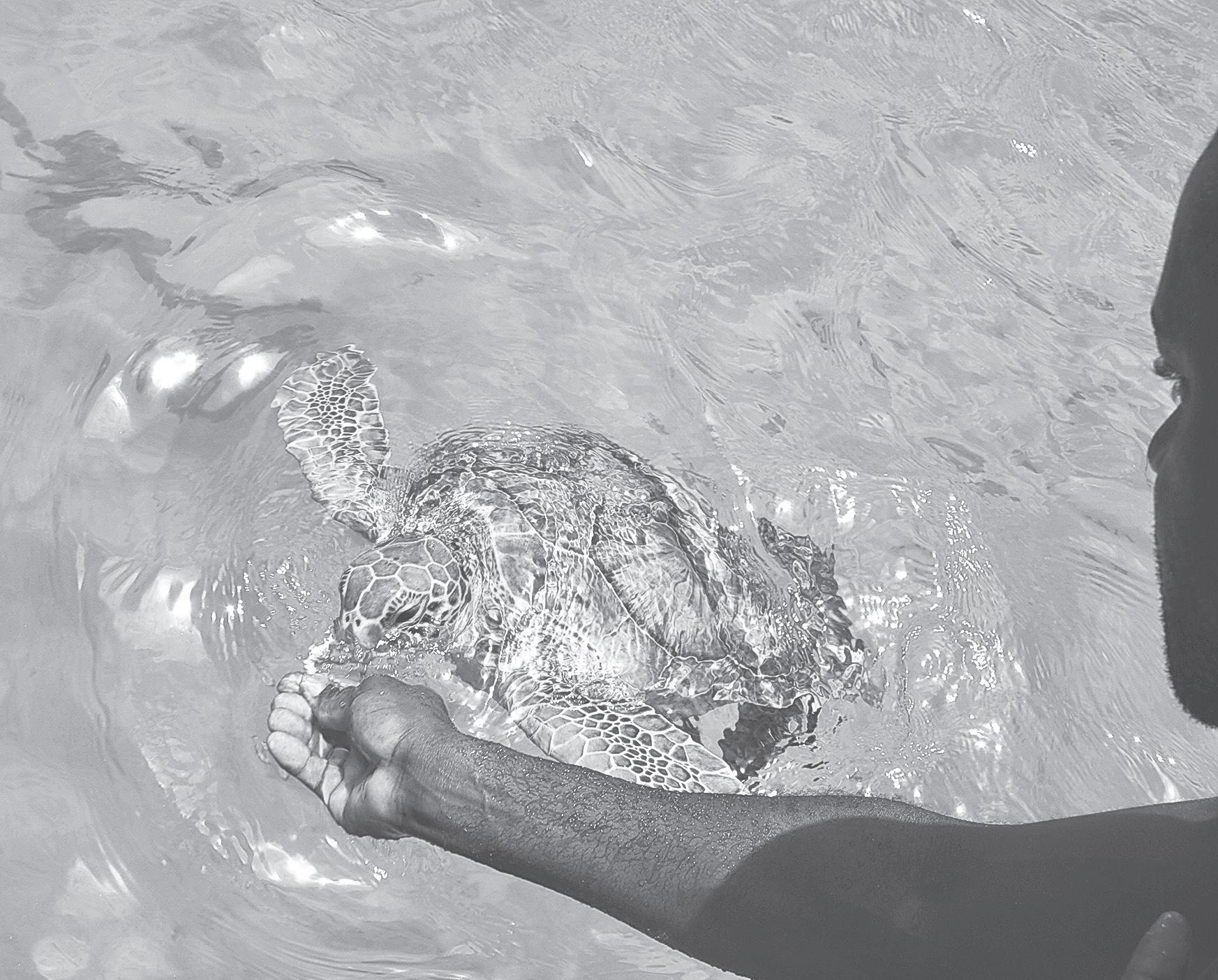
TURTLE numbers have rebounded since the Fisheries Resources Act made it illegal to capture, possess, sell, or consume any of the nation’s five marine turtle species: hawksbill, green, loggerhead, leatherback, and olive ridley.
us reeling in half-eaten gamefish,” complained one western-based Nassauvian fisherman.
A 2024 report by the Perry Institute for Marine Science, in partnership with the Bahamas National Trust, flagged this growing overlap between recovering turtle populations and stressed conch habitats as a priority for further study and urgent monitoring. Similar concerns are now echoed by community scientists and marine wardens tracking habitat degradation across several family islands.
S harks in the shallows Sharks, too, are reclaiming their place in the ecosystem. Long protected under Bahamian law, since the abrupt 2011 ban on commercial shark fishing, our waters are now among the most shark-rich in the Western Hemisphere. This has powered a thriving shark tourism industry and restored balance to marine food webs. But not everyone is celebrating. While some celebrate this as ecological resilience, others see it as direct competition.
Fishers complain of losing catch after catch to sharks that linger near boats, harbours, and cleaning stations. One fisher put it bluntly: ‘I’m being outfished by protected predators.” Dive operators and snorkel guides are also seeing increased shark presence in shallow zones, especially where feeding and chumming occur to boost wildlife sightings.
Law enforcement officers often get pleas to help some communities advocate for open seasons on some of the most successful no take species. Law enforcement officers worry that introducing open seasons might whet a demand that becomes hard to regulate. Policymakers remain divided on what’s best.
A 2023 study by the Cape Eleuthera Institute and Florida International University documented increased shark activity in nearshore areas of New Providence and Bimini, attributing it to a

combination of climatedriven habitat shifts, fish waste disposal practices, and the predictable presence of food near popular tour areas. While sharks are not actively targeting people, their growing proximity to human activity is forcing tough conversations about risk, access, and long-term management.
Conservation’s success is colliding with daily life
What we’re witnessing is not the failure of conservation. It is its consequence. Yet no national policy exists to address these growing tensions. This conversation is overdue.
These incidents reflect a broader pattern, one where wildlife recovery is reshaping how Bahamians interact with the sea. Snorkellers on day and yachting charters now expect turtles alongside them. Kayakers report shark sightings in mangrove creeks and sandbars once considered safe. And while not yet formalised in Bahamian policy, campaigns by coastal homeowners in Florida and Australia to divert turtle nesting suggest
similar pressures could emerge here.
Other countries are moving faster. Australia has implemented real-time shark tracking, netted swim zones, and feeding bans to reduce human-wildlife incidents. In Kenya, communities impacted by elephants and lions are offered compensation and a voice in management.
Even in Florida, turtle lighting ordinances help balance nesting success with development. In The Bahamas, these conversations remain fragmented. And as wildlife continues to thrive, silence may come at a cost.
Are we truly in confict or just in competition?
We often frame these tensions as if wildlife is invading our space. But was it ever truly ours? This isn’t an overpopulation of animals. It’s a reckoning. After decades of environmental damage, we are now challenged to share space with nature once again. And unlike before, we cannot push wildlife out without unravelling the very progress we’ve made.
This moment raises uncomfortable but necessary questions: the side effects of successful conservation?
contested spaces—local communities or returning species?
wildlife resurgence, or the unchecked spread of human ambition?
policies that honor both ecological needs and economic realities?
when the line between success and setback begins to blur?
The way forward must be smarter than the problem
Conservation cannot end at protection. It must grow into coexistence. That means grounding decisions in science, engaging communities, and accepting that the next frontier of sustainability is not saving species, it is managing their return.
This requires deliberate planning: updating marine spatial strategies, regulating feeding and chumming practices, studying species overlaps, and developing legal tools for conflict resolution and stakeholder compensation. It may even involve mapping marine wildlife corridors—defined zones that allow turtles, sharks, and other migratory species to move safely through highuse areas. Around the world, from the Coral Triangle to the Great Barrier Reef, planners are testing these approaches to reduce conflict, support migration, and align development with biodiversity.
Because if communities begin to view sharks, turtles, or other recovering wildlife as threats to their way of life, it won’t be long before conservation itself is seen as the enemy. And that is a risk we cannot afford. If we get this right, The Bahamas will not just be a conservation success story. It will become a model for coexistence.
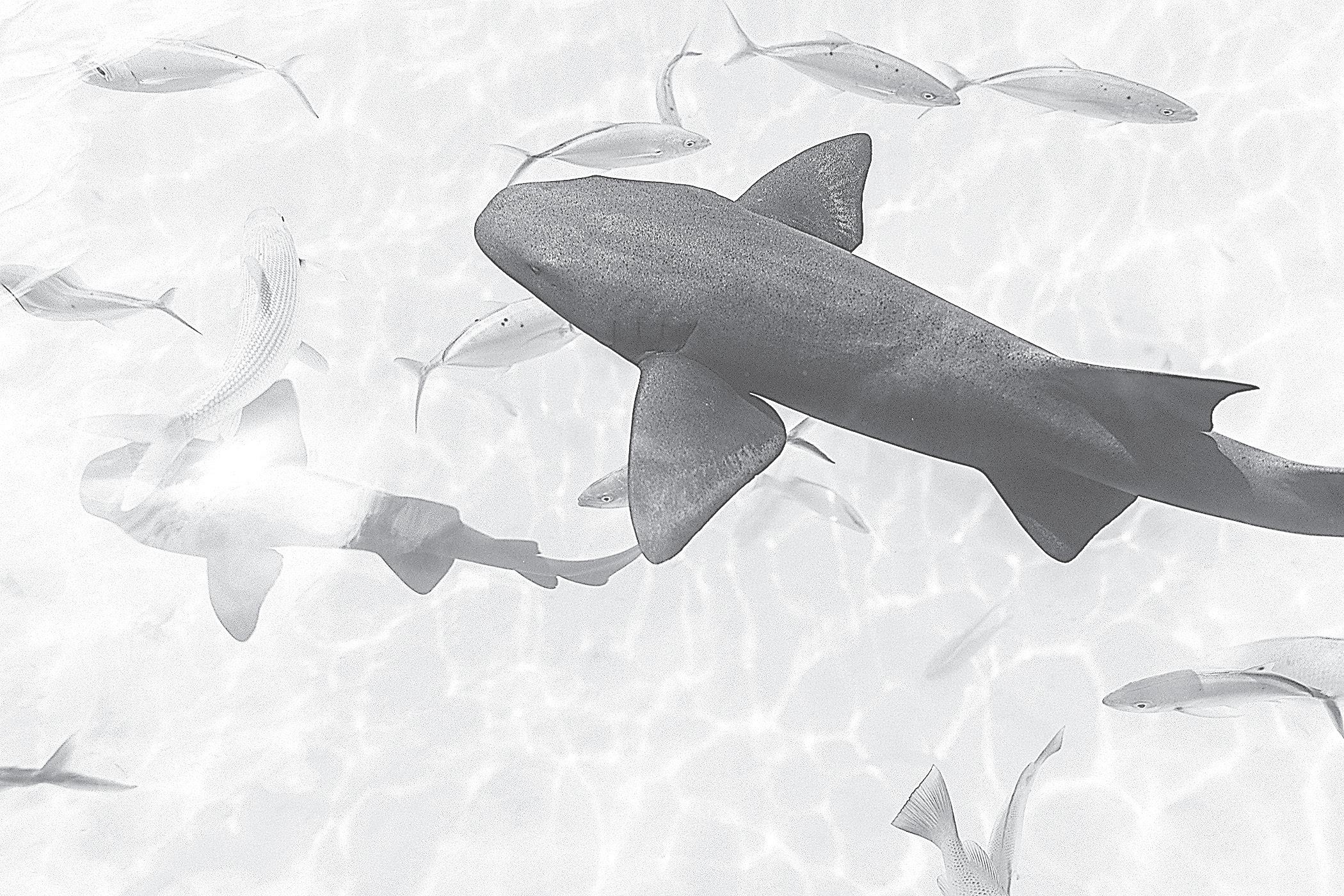
SHARKS have reclaimed their place in the ecosystem since coming under the
mian law.
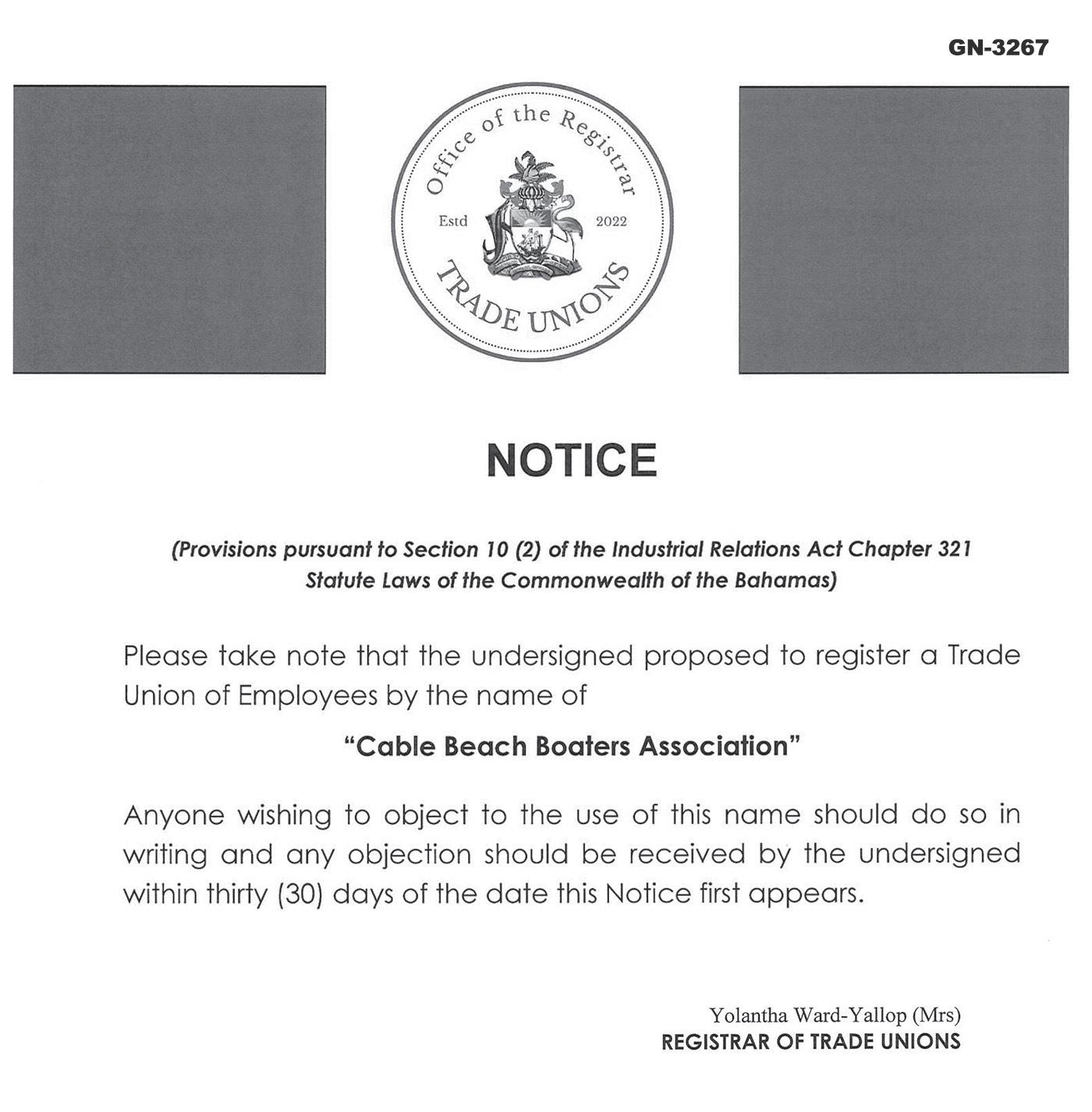
By JADE RUSSELL Tribune Staff Reporter jrussell@tribunemedia.net
JAMAICAN reggae
icon Junior Reid is set to perform at the One Blood reggae party this Saturday, as The Bahamas continues to attract international talent to its local stages. Now in its 27th edition, One Blood has grown from a small gathering into a cultural staple for lovers of old school reggae. Since its launch in 2004, the event has become a movement, a
space for reggae enthusiasts to express themselves freely while enjoying timeless hits. The party appeals mostly to fans aged 25 to 50, many of whom return year after year.
This year’s event will be held at Clifford Park, with organisers hoping the open-air venue will provide a more comfortable experience for guests. An estimated 1,500 to 2,000 attendees are expected — a mix of long-time supporters and newcomers.
One Blood is organised
by Concepts Marketing Solutions, a boutique firm specialising in marketing, event production, and brand strategy. Sponsors include Guinness and Johnnie Walker.
Leah Davis, founder of the One Blood series, confirmed that Junior Reid will be this year’s featured guest artist. Mr Reid, best known for his timeless anthem “One Blood” and his tenure as lead singer of the iconic group Black Uhuru, has been a powerful figure in reggae and dancehall for


more than four decades.
“His appearance adds a legendary element to an already powerful lineup,” Ms Davis told The Tribune.
“For our audience, many of whom grew up on his music, it’s a full-circle moment that reinforces what One Blood is all about: timeless music and unity.”
This year’s musical lineup also features Selector Ty, Selector 3D, DJ Supa
Mario, and Jason Panton, a respected DJ and cofounder of Dubwise Miami, an international sound system movement rooted in Jamaica’s reggae scene.
Looking ahead, Ms Davis said there are plans to grow the event into a broader cultural experience.
“We see One Blood evolving into a full weekend, from happy hours to daytime events and cultural
collaborations. The vision is to keep growing while protecting the soul of what makes One Blood special.”
General admission is $50, while VIP tickets are priced at $175. Tickets remain available. Doors open at 9pm. Entry to the event is cashless only; debit and credit cards will be accepted at the gate. The event is strictly 21 and over.



By PAVEL BAILEY Tribune Staff Reporter pbailey@tribunemedia.net
A MAN accused of killing two men and injuring two others in a 2021 shooting on Third Street was denied bail as he awaits trial in November.
Domonique Rolle, 28, was denied bail by Justice Franklyn Williams.
Rolle is accused of fatally shooting Akeem Davis and Lavonne Dawkins outside a residence in Coconut Grove on May 14, 2021. He also allegedly tried to kill Shakeem Campbell and Deshawn Rogers during the same incident.
The trial is set to begin on November 3.
Rolle admitted to a previous conviction for firearm and ammunition possession, for which he served an 18-month prison sentence. He told the court that his continued detention would be a hardship for his family, adding that he had worked
in air conditioning and refrigeration before his incarceration. He said he planned to live in Andros if granted bail and pledged to comply with any conditions set by the court.
The prosecution objected to bail, noting that an eyewitness had identified Rolle as one of the shooters. Prosecutors also cited the seriousness of the charges and argued that the defendant posed a flight risk or could be targeted if released.
Justice Williams ruled that, given the strength of the evidence and Rolle’s prior gun conviction, no conditions could adequately protect the public. He therefore denied the bail application.
Rolle will remain on remand at the Bahamas Department of Correctional Services.
Damien White represented the accused. Kara White appeared for the prosecution.
By PAVEL BAILEY Tribune Staff Reporter pbailey@tribunemedia.net
A MAN was denied bail yesterday after he was accused of possessing a loaded assault rifle in New Providence last week.
Marcello Harris, 29, was charged before Magistrate Lennox Coleby with possession of an unlicenced firearm and possession of ammunition with intent to supply. He was allegedly found with a Del-Ton Inc rifle and 27 rounds of .223
ammunition on July 20. Harris pleaded not guilty.
Assistant Superintendent of Police Lincoln McKenzie objected to bail on public safety grounds. Despite attorney David Cash arguing his client posed no risk to the public, bail was denied. Harris was informed of his right to apply for bail in the Supreme Court. He will be remanded to the Bahamas Department of Correctional Services until his trial begins on September 25.

By JADE RUSSELL Tribune Staff Reporter jrussell@tribunemedia.net
JAMAICAN reggae
icon Junior Reid is set to perform at the One Blood reggae party this Saturday, as The Bahamas continues to attract international talent to its local stages. Now in its 27th edition, One Blood has grown from a small gathering into a cultural staple for lovers of old school reggae. Since its launch in 2004, the event has become a movement, a
space for reggae enthusiasts to express themselves freely while enjoying timeless hits. The party appeals mostly to fans aged 25 to 50, many of whom return year after year.
This year’s event will be held at Clifford Park, with organisers hoping the open-air venue will provide a more comfortable experience for guests. An estimated 1,500 to 2,000 attendees are expected — a mix of long-time supporters and newcomers.
One Blood is organised
by Concepts Marketing Solutions, a boutique firm specialising in marketing, event production, and brand strategy. Sponsors include Guinness and Johnnie Walker.
Leah Davis, founder of the One Blood series, confirmed that Junior Reid will be this year’s featured guest artist. Mr Reid, best known for his timeless anthem “One Blood” and his tenure as lead singer of the iconic group Black Uhuru, has been a powerful figure in reggae and dancehall for


more than four decades.
“His appearance adds a legendary element to an already powerful lineup,” Ms Davis told The Tribune.
“For our audience, many of whom grew up on his music, it’s a full-circle moment that reinforces what One Blood is all about: timeless music and unity.”
This year’s musical lineup also features Selector Ty, Selector 3D, DJ Supa
Mario, and Jason Panton, a respected DJ and cofounder of Dubwise Miami, an international sound system movement rooted in Jamaica’s reggae scene.
Looking ahead, Ms Davis said there are plans to grow the event into a broader cultural experience.
“We see One Blood evolving into a full weekend, from happy hours to daytime events and cultural
collaborations. The vision is to keep growing while protecting the soul of what makes One Blood special.”
General admission is $50, while VIP tickets are priced at $175. Tickets remain available. Doors open at 9pm. Entry to the event is cashless only; debit and credit cards will be accepted at the gate. The event is strictly 21 and over.



By PAVEL BAILEY Tribune Staff Reporter pbailey@tribunemedia.net
A MAN accused of killing two men and injuring two others in a 2021 shooting on Third Street was denied bail as he awaits trial in November.
Domonique Rolle, 28, was denied bail by Justice Franklyn Williams.
Rolle is accused of fatally shooting Akeem Davis and Lavonne Dawkins outside a residence in Coconut Grove on May 14, 2021. He also allegedly tried to kill Shakeem Campbell and Deshawn Rogers during the same incident.
The trial is set to begin on November 3.
Rolle admitted to a previous conviction for firearm and ammunition possession, for which he served an 18-month prison sentence. He told the court that his continued detention would be a hardship for his family, adding that he had worked
in air conditioning and refrigeration before his incarceration. He said he planned to live in Andros if granted bail and pledged to comply with any conditions set by the court.
The prosecution objected to bail, noting that an eyewitness had identified Rolle as one of the shooters. Prosecutors also cited the seriousness of the charges and argued that the defendant posed a flight risk or could be targeted if released.
Justice Williams ruled that, given the strength of the evidence and Rolle’s prior gun conviction, no conditions could adequately protect the public. He therefore denied the bail application.
Rolle will remain on remand at the Bahamas Department of Correctional Services.
Damien White represented the accused. Kara White appeared for the prosecution.
By PAVEL BAILEY Tribune Staff Reporter pbailey@tribunemedia.net
A MAN was denied bail yesterday after he was accused of possessing a loaded assault rifle in New Providence last week.
Marcello Harris, 29, was charged before Magistrate Lennox Coleby with possession of an unlicenced firearm and possession of ammunition with intent to supply. He was allegedly found with a Del-Ton Inc rifle and 27 rounds of .223
ammunition on July 20. Harris pleaded not guilty.
Assistant Superintendent of Police Lincoln McKenzie objected to bail on public safety grounds. Despite attorney David Cash arguing his client posed no risk to the public, bail was denied. Harris was informed of his right to apply for bail in the Supreme Court. He will be remanded to the Bahamas Department of Correctional Services until his trial begins on September 25.

How prison affects black men’s mental health long after they’ve been released
MIKE returned home to Philadelphia after a 15-year prison sentence and suffered an emotional breakdown.
I just couldn’t stop crying … I don’t know. It was the anxiety. It was just a lot,” he said. “I was under a lot of pressure and it just came crashing down.”
Mike, who was in his late 40s when we spoke, told me about his childhood filled with abuse, his first arrest at age 14, and the over 20 years of his life that he spent behind bars.
As a registered nurse and nurse scientist who studies how incarceration affects mental health, I know Mike’s experience after release from prison is not uncommon. Studies show that black men who have experienced incarceration have higher rates of PTSD, depression and psychological distress compared with black men who have never been incarcerated.
Working in psychiatric hospitals in Philadelphia, I met many patients in crisis who had been incarcerated at some point in their lives. As a part of my doctoral research, funded by the National Institute of Nursing Research, I interviewed 29 formerly incarcerated Black men to understand how incarceration has affected their mental health.
My peer-reviewed findings were published in the journal Social Science and Medicine. All quotes shared here use pseudonyms to protect the men’s privacy.
Trauma of incarceration
Mass incarceration in the US has serious health consequences for individuals, families and communities.
In Philadelphia alone, over 20,000 people return home from incarceration each year.
While incarceration rates are declining in Philadelphia, the needs of those coming home remain significant.
Many formerly incarcerated men described experiencing or witnessing violence, including being beaten by correctional officers and witnessing close friends get assaulted or killed.
“You know you are not regular because you come from a traumatic situation, right?” said Thomas, 44, who spent 18 years incarcerated.
The participants expressed that racism was common, especially while incarcerated in facilities located in the rural central and northern regions of Pennsylvania.
I ain’t gonna sugar coat it – black people going up into them white people mountains, they call you [n-word] all day long and you basically there to accept it,” Antonio told me. Incarceration was especially difficult for those who were held for months pretrial without ever being convicted and those incarcerated during COVID restrictions who spent more than 23 hours a day in their cells.
‘Even though I’m free, I ain’t free’
Participants described life on parole or probation, or in transitional housing, as another form of confinement.
Ken, 56, has been out of prison for over a decade but said, “I’m still locked up, even though I’m free, I ain’t free. You just get a whole new set of rules and regulations.”
Men described significant anxiety related to community supervision
requirements, including difficulty sleeping the night before a probation appointment.
Participants also described distress caused by “no association” restrictions. These are common parole and probation requirements that prohibit people under supervision from interacting with others who have criminal records, are also under supervision or are currently incarcerated. Violating this requirement can lead to a technical violation and reincarceration.
While these requirements are meant to reduce the risk of reoffending, they often isolate people from supportive relationships and resources, including housing and employment.
“[There are] a lot of smart brothers in there. And it hurts my heart. And that’s where the depression coming in too,” said Reese, who spent six years incarcerated. “I can’t contact them in jail… That’s just how it is in the system.”
Philadelphia has the highest rate of community supervision – including probation and parole – among the largest US cities, according to a 2019 analysis by The Philadelphia Inquirer.
At that time, the Inquirer reports, 1 in 23 adults in Philadelphia were under community supervision –and 1 in 14 black adults in Philadelphia.
The men I interviewed said they felt like parts of them never left jail or prison, while others felt that they brought prison or jail home with them.
Tyrese, 34, said he stays home as often as he can.
“I’ve been out of the joint for seven years now and feel like I’m still institutionalised, I guess,” he said. “I know people that don’t even come outside,” referring to other formerly incarcerated men.
Others had dreams that they were back in a cell, or at home still wearing jail clothing. Long after release, many described constant hypervigilance and anxiety.
“I can be walking to the bus station and there be people walking around me, I’m constantly watching them,” said Anthony, who was first incarcerated at age 18 and served 16 years. “I’m watching every movement they’re doing. That’s a habit I had from jail.”
Finding work
People who have been incarcerated often struggle to find employment after release, as many employers are unwilling to hire a person with a criminal record.
This leaves about 35 percent of formerly incarcerated black men unemployed.
At the time of our interview, Tay, 31, was working part-time in carpentry. “Because I had felonies on my record a lot of places won’t hire me,” he said. “And a couple of places that I was working with, they ended up firing me once they did the background check.”
These frustrations can easily spill over into family life.
Mark, 30, also works part-time and said he found himself frequently becoming agitated and snapping at his kids, other family members and his girlfriend.
“I can’t get the job I want or the job that I need to do what I need to do for my family and I’ll be frustrated,” he shared.
Participants struggled with having to depend on others for basic needs upon release. Kenny, who is now self-employed as a caterer,
recalled his experience a few years earlier. “I was crying. I was a grown man, almost 40 years old, and my mother had to buy me underwear, socks,” he said.
The importance of fatherhood
Despite their many hardships, some of the men spoke with joy about reconnecting with their children.
I think the most positive thing that happened since I’ve been out of prison is I got custody of my sons,” said Ken, a father of two. “Them kids saved me.”
Like many of the other participants with children, however, he was frustrated about being unable to provide for them and worried about repeating harmful cycles.
“You want to do good, but it makes you think bad stuff when you don’t have the right resources,” he continued. “You don’t want [your kids] to do the same things you did.”
Others struggled to bond with their children after years of separation.
John, 29, explained, “The bonding is kind of awkward, because you wasn’t there, especially during the pandemic when there was no visits allowed.”
Returning to disadvantaged neighbourhoods
Most people released from incarceration return to neighbourhoods with high rates of poverty, violence and other disadvantages.
Shawn, who lives in pubic housing, showed me abandoned buildings and boarded storefronts in his neighborhood and described how the environment made rebuilding his life harder.
For many participants, returning to divested communities brought stress. They experienced frequent exposure to substance use, violence and negative police encounters, and they had limited access to basic resources and job opportunities needed to support recovery and stability.
“This is my real life. It’s not fake. It’s not no, ‘Well,

“You want to do good, but it makes you think bad stuff when you don’t have the right resources,” he continued. “You don’t want [your kids] to do the same things you did.”
why did he go back and do this or that?’” he said. “I live in an underserved, impoverished, danger zone – period.”
Moving forward
The experiences these men shared with me demonstrate how traumatic incarceration is, even many years after release.
Supporting the mental health of formerly incarcerated black men requires trauma-informed services, such as culturally responsive counseling, peer support and care that acknowledges the lasting effects of incarceration.
It also means helping them build or rebuild their financial resources, reconnect with their children and loved ones, and supporting the broader communities they return to through investment in housing, employment and accessible health and social services.
Originally published on www.theconversation.com.

By DEVI SHASTRI Associated Press
HEALTH officials in Colorado say the state’s measles outbreak is over, and the US added just 10 confirmed cases nationally in the last week.
Wednesday’s national case count stood at 1,319, according to the US Centers for Disease Control and Prevention. Earlier this month, the US passed the total count for 2019, when the country almost lost its status of having eliminated measles.
A vast majority of this year’s cases are from Texas, where a major outbreak raged through the late winter and spring.
Other states with active outbreaks - which the CDC defines as three or more related cases — include Arizona, Georgia, Iowa, Kansas, Kentucky, Michigan, Missouri, Montana, New Mexico, Oklahoma and Utah.
There have been three deaths in the US this year, and all were unvaccinated: two elementary schoolaged children in West Texas and an adult in New Mexico.
North America has three other large outbreaks.
The longest, in Ontario, Canada, has resulted in 2,276 cases from midOctober through July 15. The province logged its first death June 5 in a baby who got congenital measles but also had other preexisting conditions.
Another outbreak in Alberta, Canada, has sickened 1,472 as of Tuesday. And the Mexican state of Chihuahua had 3,296 measles cases and 10 deaths as of Tuesday, according to data from the state health ministry.

Measles is caused by a highly contagious virus that’s airborne and spreads easily when an infected person breathes, sneezes or coughs. It is preventable through vaccines and has been considered eliminated from the US since 2000.
The state health department is not releasing which counties have cases, but no counties have recent public exposures.
Georgia has an outbreak of three cases in metro Atlanta, with the most recent infection confirmed June 18. The state has confirmed
six total cases in 2025. The remaining three are part of an unrelated outbreak from January.
Iowa announced another measles case on Tuesday, bringing the state’s total to eight in 2025. The state health department said the new case isn’t linked to others in the state, and occurred in a person who was fully vaccinated.
An outbreak in eastern Johnson County involves four cases in members of the same household.
Kansas was steady this week with 90 cases across 11 counties in the southwestern part of the state,
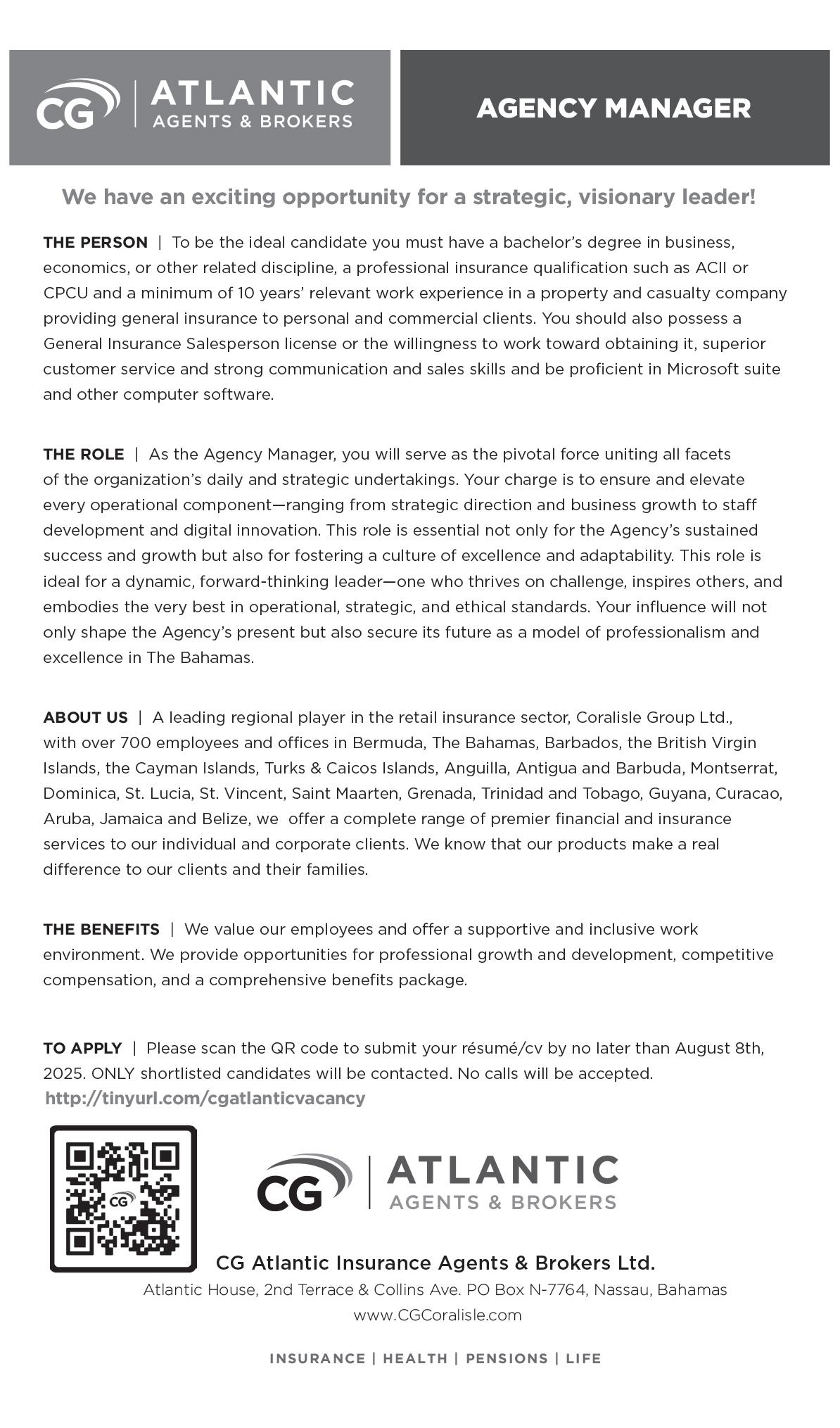
with eight hospitalisations. All but three of the cases are connected, and most are in Gray County. Kentucky has 13 cases this year.
Central Kentucky’s outbreak rose to nine cases as of July 8. The cases are in Fayette County, which includes Lexington, and neighbouring Woodford County.
Michigan has had 18 cases total in 2025; eight are linked to outbreaks.
In northern Michigan, Grand Traverse County has an outbreak of four cases as of Wednesday. An earlier outbreak of four cases in Montcalm County was declared over on June 2.
Missouri stayed steady with seven cases as of Wednesday.
Five cases are in southwestern Cedar County, and four of those are members
of the same family. The fifth case is still under investigation, according to county health director Victoria Barker. Montana added two measles cases this week for a total of 27. Cascade County confirmed its first case.
Seventeen were in Gallatin County, which is where the first cases showed up — Montana’s first in 35 years. Flathead County has two cases, Yellowstone County had three and Hill County had four cases. There are outbreaks in neighbouring North Dakota and the Canadian provinces of Alberta, British Columbia and Saskatchewan. Measles cases also have been reported this year in Alaska, Arkansas, California, District of Columbia, Florida,
Hawaii, Louisiana, Maryland, Minnesota, Nebraska, New Jersey, New York, North Carolina, Oregon, Rhode Island, South Carolina, South Dakota, Vermont, Virginia, Washington and Wyoming.
E arlier outbreaks in Illinois, Indiana, North Dakota, Ohio, Pennsylvania and Tennessee are over. Cases and outbreaks in the US are frequently traced to someone who caught the disease abroad.
T he best way to avoid measles is to get the measles, mumps and rubella vaccine. T he first shot is recommended for children between 12 and 15 months old and the second between 4 and 6 years old.
T here’s no specific treatment for measles.
THR EE Haitian policemen and an informant were killed and a fourth officer is missing in the country’s central region, where gang violence has surged, Haiti’s National Police said Wednesday.
T he officers were members of a specialized unit known as UDMO, which is largely activated during protests and disturbances.
A video shared on social media show gunmen dragging the bodies of at least two officers near a burning armoured vehicle as heavy gunfire fills the air.
Haiti’s National Police said in a statement that
authorities would intensify operations against armed gangs in A rtibonite as it mourned the officers’ deaths.
SPNH-17, a local police union, called on the government to better protect police as it warned they were preparing to revolt.
“The government does not give the police any importance. If they took this seriously, they would have made the means and support available to the police and the military to end the insecurity,” the union said. “ Too many police officers have fallen.”
Haiti’s transitional presidential council said that the government was
mobilizing all necessary resources to investigate the killings and honor the memory of those slain.
From October 2024 until the end of June, more than 1,000 people were killed, 213 injured and 620 kidnapped in Haiti’s A rtibonite and Central departments, according to the UN human rights office.
A Kenyan-led, UNbacked mission is helping Haiti’s National Police to quell gang violence, but officers often are overwhelmed by powerful gangs with military-grade weapons. A t least two Kenyan officers have been killed this year, both in A rtibonite.
What to know about Parkinson’s disease after Ozzy Osbourne’s death
Associated Press
Heavy metal rocker
Ozzy Osbourne died this week at 76, just weeks after his farewell show and about fve years after announcing he had Parkinson’s disease. Here’s what to know about the disease: Parkinson’s is a neurologic disease that robs people of control over their movements. It typically starts with tremors and is characterized by slow movement, a shuffing gait, stiff limbs, balance problems and slurred speech. about 1 million americans are living with Parkinson’s, and 10 million people worldwide, the Parkinson’s Foundation. estimates. It usually appears after age 60, although sometimes it can develop before age 50.
The exact cause isn’t known, but Parkinson’s develops when cells that produce one of the brain’s chemical messengers, called dopamine, begin to deteriorate and die. Dopamine transports signals to parts of the brain that control movement. Parkinson’s symptoms appear after enough dopamine-producing cells die that there’s too little of this neurotransmitter in the brain. According to the foundation, most experts believe genetic and environmental factors are behind the disease. Dozens of gene mutations linked to Parkinson’s have been discovered and genetics account for 10% to 15% of all cases. Other factors suspected of increasing the risk include head injuries, exposure to pesticides and herbicides
and where you live. There is no cure but there are treatments, including medications that affect dopamine levels and a surgically implanted tremor-blocking device. Patients also can beneft from physical and occupational therapy. Symptoms worsen over time, usually slowly. The severity of symptoms and how quickly they progress varies widely between patients. In advanced cases, people may be unable to walk or care for themselves. They also can suffer from depression as well as memory and thinking problems. While Parkinson’s itself isn’t considered fatal, people can die from complications of the disease, including lung problems as muscle weakness impedes the ability to cough and to swallow.

for Grand Bahama oficially recognised at a July 16 press conference.
F ORTY-SEVEN individuals were officially recognised for their outstanding contributions to the island of Grand Bahama during a press conference held July 16, 2025 at the Foster B. Pestaina Centre.
T hey are set to receive their national honours on N ational Heroes Day, O ctober 13. T he awards will be presented by Governor General, Dame Cynthia ‘Mother’ Pratt.
The honorees are:
Neko Grant - Former Cabinet Minister & MP
Mrs Barbara Gertrude Thompson - Retired Educator
Mr Bradley Lester Ambrister - Late Family Island Administrator
Mrs Carolyn Patricia Rolle - Retired Educator
Mr Cecil Jeffrey Thompson - Retired Educator
Mrs Cynthia Donalson - Member of the Women’s Suffrage Movement
Dr Donald Maury McCartney - Retired Educator
Rev Hartley Eugene Thompson - Senior Pastor, Freeport Gospel Chapel
Mr Hezekiah Nemore John Dean - Retired Educator
Mrs J. Maria Doris Thompson - Retired Founding Principal, Freeport of Freeport Gospel Chapel School
Rev Mary Elizbeth Russell - Retired Educator
Mrs Mildred Roberts - Retired Educator
Mrs Myrton Eloise King - Retired Educator
Dr Pamela Emily Mills - School Psychologist
Dr Paula Aretha Mortimer - Retired Educator
Mr Felix Sonny Johnson [Deceased] - Legendary Bahamian Musician
Mrs Victoria Elthedra Wright - Retired Educator
Mrs Yvonne Loretta Ward - Retired Educator
Bishop Simeon Outten - Pastor of New life Worship Center & Iconic Gospel Artist
Rev Dr Benjamin Edward Ferguson - Pastor Emmanuel Missionary at Baptist Church & Retired Senior Public Officer
Mr Kelly Burrows - Retired Hotel Executive
Mr Advardo Dames, Assistant Commissioner of Police
Mrs Alisa Annette Streather-Robinson, Head of Art & Craft Department, Jack Hayward Senior High School
Mrs Cheryl Marie Bain - Retired Nurse
Mrs Demaris Deloris Thompson - Retired Educator
Mrs Daphne Lewis-Barr - Retired Educator
Mrs Palma Stubbs-Pratt - Deceased Legendary Nurse
Mrs Dorothy Maxine Lightbourne - Deceased, Legendary Educator
Mrs Denise Leonora Pinder - Assistant Parliamentary Commissioner
Mrs Elcina Lavern Duncombe - Retired Educator
Bishop Kermit Eugene Saunders - Pastor Kingdom Worship Center
Mr Ricardo Anthony Lightbourne - Retired Sports Reporter & Journalist
Mr Averell Mortimer - Retired Educator
Beulahmae Fowler
Rev Carolyn Cooper - Senior Pastor, Invaders for Christ
Superintendent Doyle Livingston Burrows - Royal Bahamas Police Force
Mrs Estelle Elizabeth Pinder - Retired Nurse
Mr Godfrey Pinder - Sports Legend
Bishop George Edward Thompson - Retired Pastor, Church of God of Prophecy, Coral Road
Mr James Layman Hadley Forbes - President, H. Forbes Chater & Tours
Mrs Judith Melony Dawkins - Retiree ZSN
Mrs Monique Elizabeth Leary - Retired Cultural Affairs Officer, MYSC
Rev Kermit Mullings - Pastor, Abundant Assembly of God, EMR
Mrs Sherril Paulette Woods - Principal, Sunland Baptist Academy
Mrs Nell Wildgoose Russell - Softball Legend
Mr Edison Oswald Laing
Mrs Annaleta Elaine Swann - Retired Educator

